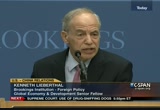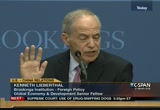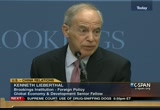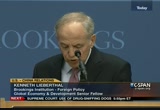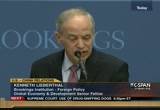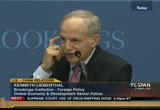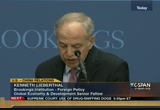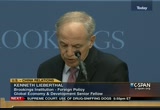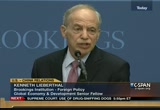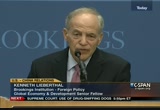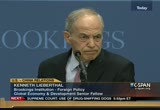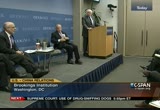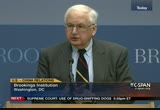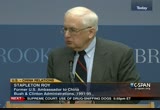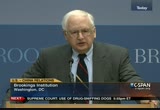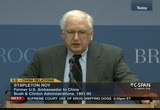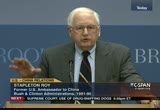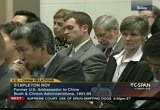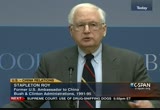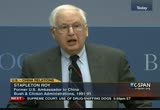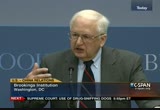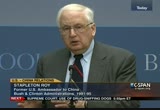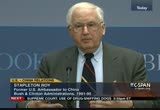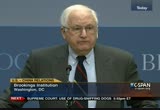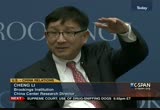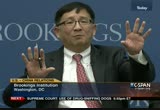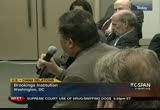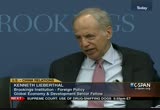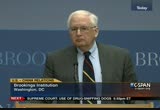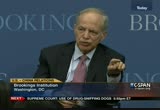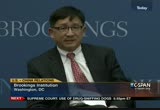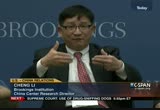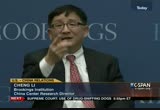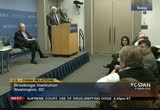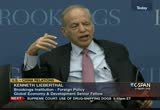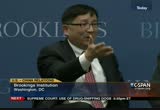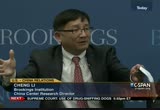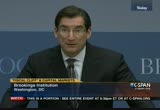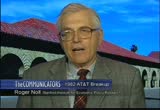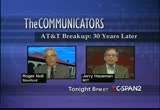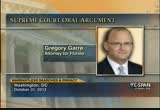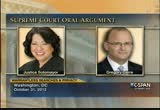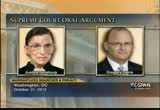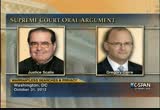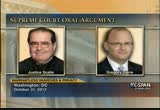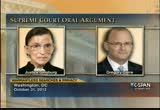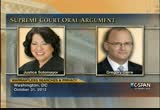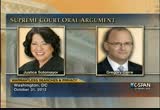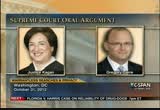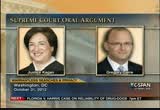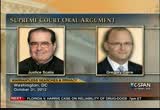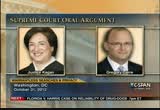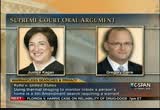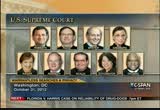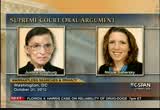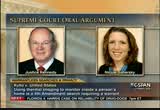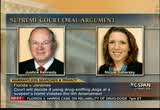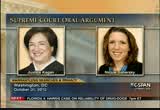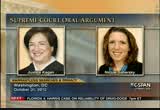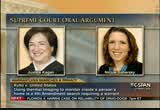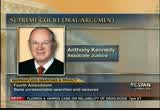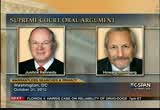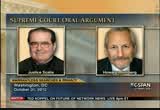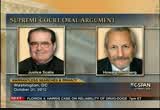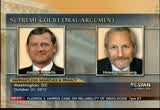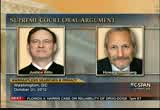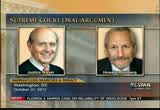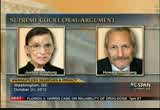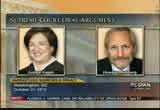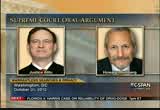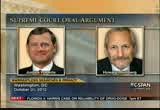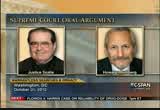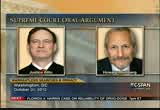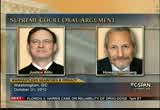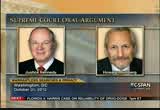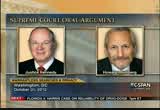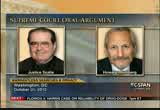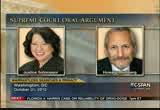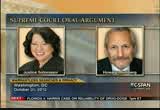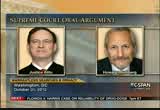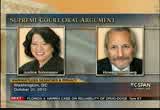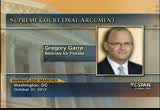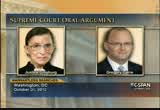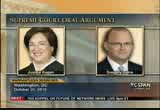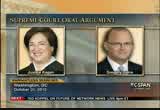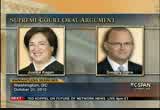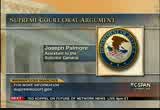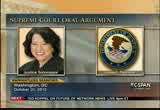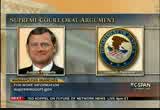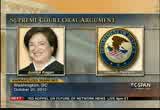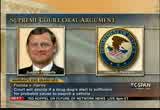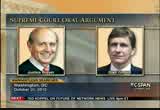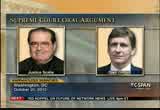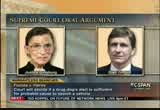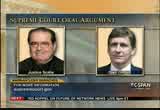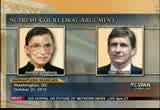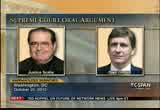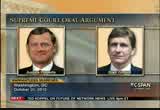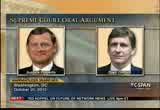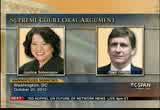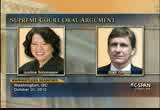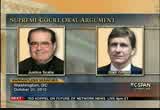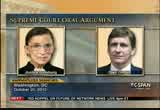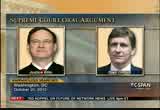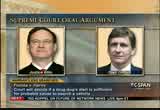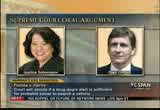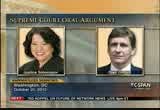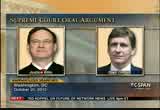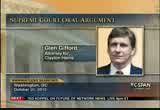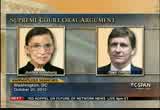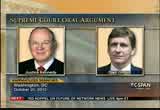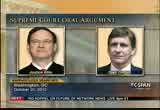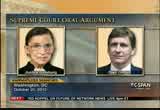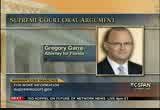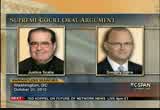tv Public Affairs CSPAN November 19, 2012 5:00pm-8:00pm EST
5:00 pm
publicly. his past record suggests he is capable and cautious. i have seen speculation about his priorities and how strongly he will pursue them almost across the board. in china, i talked to a number of people you think would know. her hands in a general and a half and harriet most other -- most others do not to their hand on where they stand. you have to keep in mind you can have a group of people, everyone favors reform. in a political system, you have to decide what is your top priority? what are you willing to use your political capital for? what is your second biggest
5:01 pm
priority because you are not likely to get to the third. uc obama facing that now with climate change, the fiscal deal, emigration, etc.. the issue is not whether he supports those, what is he willing to go to the mat for? i think what we face and the standing committee may be people in favor of reform but we do not have a clue as to whether they are prepared to go to the mat for the same reforms and whether they can reach agreement on tough decisions with an agreed upon priority for those decisions. the candidates who did to their hands as to what changes they would like to see did not make it on to the standing committee. they fixed it ties -- they do
5:02 pm
not get you far in anticipating substantive positions and priorities. that does not necessarily get you to there. but the substantive positions and priorities are important for anticipating what the anticipation -- future is going to hold. substantively, serious reform is a very complicated matter. much more complicated in china than in the u.s. given the array of reforms that are corte each country's future. you need to take that complexity into account and you anticipate what is going to occur there. in china this requires changes in the development model that china is pursuing and basically changes from the former model to the least what they have
5:03 pm
anticipated in -- what they stipulated in the five-year plan. something closer to what is in the world bank report that came out last spring. these are very complicated and wide ranging changes. there are deeply rooted vested interests that will oppose parts of the 12 fighter plan and these are powerful interests. local, territorial, and -- political leaders. this is in part because they benefit from the current development model. they have a lot of power within their bailiwicks and a lot of flexibility. it is in part i have been startled as i get into this issue more. many of these positions are bottom sold. this is not necessarily a meritocracy move. people did not handle
5:04 pm
themselves effectively. with five level political systems, in the thousand of these 40,000 territorial units. if you look at the top two people, 80,000 people you're talking about many of whom have purchased their positions and see them as a basis for future wealth. not easy to carry out reform. it changes the options. the big national level state owned enterprises are tied to the lead political families. none of the reforms will be resisted from them and many of the ministries resist reform and i think what we will see in the upcoming npc is the move toward the super-ministries and that is not necessarily going to help reform. you can argue it either way but
5:05 pm
that is my instinct. tefra forms will require tough decision making on the politburo standing committee. this is a division of labor, you can tell what each one's responsibility is and the consensus decision making role. not a majority but a consensus. you put this two things together and it is very hard to get decisions that run against the grain. of any of the members of the standing committee. you can get decisions to spend more money. it is hard to get this is -- hard to get decisions that this advantage key groups. we will see if they alter that system. surber reforms will require tackling sensitive issues. this is the commercialization of land, the scope of the state's role in allocating scarce resources and permissions and so forth. these are not easy issues to
5:06 pm
handle politically in any kind of political system. reforms are complicated. they touch a lot of serious and should -- interest and they run against the distribution of power. finally, this is a transition period until the national people's congress in march. beyond march, you have to assume there is some period of months before something is settled down. you're not likely to get serious of reforms implemented before you have the state council settle down and the transition over. therefore what should we expect from the 18th congress and i will move through this quickly? they may try to set a new tone. i just read his speech to the
5:07 pm
first study session of the new politburo and it was not encouraging in terms of moving away from jordan. it reminded me his graduate degree is in marxism. preferences and is operational priorities i think will only be revealed over time. the record to date, the does not provide sure guidance on this issue. let me conclude with some comments on each of broad categories and issues and what we might look for in each of we were to see significant reform take place. on restructuring the economy, again, we will have to wait until the latter part of 2013 at least before we can look for any of these things on a significant level. they indicate some things i will be looking for. first, there will reconfigure or
5:08 pm
have to reconfigure interest rates in the staid banking system to provide substantial positive returns on household savings. that should be the easiest of the steps they can take. they need to adopt measures to separate the government from enterprises. i think that is very tough and it runs against recent trends. i think there will have to open up what are the monopoly or quasi-monopoly sectors of the economy dominated by major state-owned enterprises and do so in sectors that are attractive for private firms to get into. open up railways as they have done. you cannot make money in the railway system. there are private firms that have interest if you have finances where there is money to be made it will be a different thing. they will have to undertake tax structure reform in order to create a legal basis for
5:09 pm
localities to raise budgetary funds. that is a short list of what they will have to do. even that is tough enough a short list that it may well take the perception of genuine crisis to produce steps toward the major economic structural reform with its attendant political changes. in dealing with society it is important -- there is important and low hanging fruit types of steps to take. things that are so counterproductive that if they do not do these you wonder what they will do. my short list of that would be to abolish the system. this is the greatest single source of any quality of wealth. you cannot see how they will move the household savings, especially household spending has a major driver of the economy. if you maintain that system that prevents 300 million people
5:10 pm
living in cities from making serious money, acquiring serious property and exercising their rights as urban citizens. they can substitute criteria for urban residents is but they have to change fundamentally the system as it exists. secondly move to aid to child policy. one policy -- one child is a catastrophe. this will have a long term impact but if they cannot do this at this point, you have to wonder about the ability to take on anything that is politically sensitive. third, establish a legal framework in which ngo's can operate more freely. for example, environment is one of the issues they tag is one of the most important challenges. i agree 100% with that. i know no major country in the world that has made significant
5:11 pm
progress on environmental cleanup without a vibrant, grain movement. and ngo grain movement that can engage in political activism as well as political education. systems are built around the interests of the leaders. you need some counterpressure. not just pressure from above but from below if you're going to change that. let me conclude with political reform. they need to reconfigure incentives for local officials. this is an enormously context -- complex task. i will lay out why it is impossible to change the model without changing the operational incentives. otherwise their vested interests lead them to do what they are doing. regardless of where beijing thinks it is putting its money. they need to strengthen the
5:12 pm
independence of the legal system hopefully what to wear top officials are also subject to legal constraints. they need to increase genuine political competition through the townships level and within five years to the county level. leaving competition vega in detail. there are different things i could do but they need to move beyond what they have done today which is listening out somewhat the people's congress legislative system. fourth, they need to implement party rules on internal decisions and they keep talking about this but the progress seems to be limited. they need to seriously attacked corruption. one thing that being said in this speech the day or two ago, the one thing that he lit into was corruption and compared
5:13 pm
china to the middle east. he referred to other countries that had strong one-party system that have collapsed recently and said we have to tackle corruption. he recognizes certainly that the scope and magnitude of the problem frankly i am not optimistic about this. but i certainly wish them well. my bottom-line conclusion is that during the major crisis that creates leverage at the top, the odds of chinese reforms are well below those of u.s. reforms in the coming four years and i do not regard those as good news either for china or the united states. thank you. [applause] >> thank you. we have just had a very
5:14 pm
sobering presentation and an equally rich one by chung lee. we will post a transcript on the website so you should be watching for that. >> i will be looking eagerly for the transcript because i do not think you can get a better send -- set of presentations in china's leadership transition then we have just received. chung lee has lived in depth at the political alignments and biographies, down to the sub- global that he did not get into at this time. he could discuss the sixth and seventh generation leaders and we're trying to analyze the fifth generation. commentsrthal's
5:15 pm
reflected an in-depth knowledge of the difficulties of pushing for reform in a country the size of china. this does not leave me a whole lot to say. i would try to tease out some additional elements that i think are important in thinking about china posing new leaders. first, one-party systems function differently from multi- party systems. one of the characteristics is that you do not know how leaders will behave until they are in the top spot. because you cannot get to the top spot if you are taking a different approach from the predecessor leaders. nobody identified deng zhao ping
5:16 pm
as a reformer. no one identified gorbachev as a radical reformer but he pushed through reforms a radical it ended up in the collapse of communist rule in the soviet union and the disintegration of the country. we have to be cautious in trying to assess exactly how they will perform as the top leaders. they're not supreme leaders. they have to preside over a collective leadership. and the ash -- attitudes of the other members of the collective farm important. but they are in the most influential positions to try to shape a sense of where the country should be moving. and if there is one thing that permeates the work report, it is the idea that there has to be
5:17 pm
fundamental reforms in china. i think this reflects the realities of the country. when you think about reform, ken went into this in detail but it is worth thinking about it at a higher oil. what are the influences that will affect the thinking of the leaders as they look at what needs to be done in china? the first thing is age. china has through this system of age limits, every time they have a significant change in leadership such as they just had, the age of the top leaders is reduced. in the case of the politburo, the average age is five years under for members than the outgoing 17th politburo. that produces a change in attitude.
5:18 pm
you also because of this assumption of a two term service for the top leaders, you have a situation where the top leaders are younger than the other leaders. there are some people younger in the politburo but in the case of paying and -- ping and chong, they are five years younger. this age matter? the answer is, it really does matter. china has gone through bigger changes over the last three decades than any other country in the world. i can remember, you may be able to remember the incredible change on the part of american young people between those who were part of the vietnam war generation and the media post-
5:19 pm
vietnam war generation. serving abroad, i could discover in meeting people in college how radically different their way of thinking is. in many ways -- [indiscernible] china has had changes that are similar. that is reflected in the fact that the general secretary's were purged in 810-year period because the changes taking place for faster than china had
5:20 pm
a stable system for managing. that is the issue that can was addressing. we have had 20 years of destabilizing of growth at a the stabilizing speed. to maintain and nearly average of 10% annual growth has produced and curb a dramatic changes in china. it is not possible for a system. it has adapted the ideology over the last 20 years but has not adapted the way of managing things sufficiently to guarantee stability in the future and this will be an important factor. i would like to add chung lee has done some outstanding work in terms of establishing concepts such as the princeling
5:21 pm
group and the china youth league group and these are important distinctions but there are other distinctions that need to be borne in mind. i think for example in analyzing ping, we need to look at his father. he was a princeling, he had impeccable revolutionary credentials. he was already a revolutionary and member of the chinese communist party when the long march ended in 1935. he rose to become a vice premier of china but he was purged in 1962 and he spent 17, 18 years in a political dog passed during 1962 through the opening of the reform and -- policies. this had a major impact on him. he had extreme difficulty in getting into the communist party. he had according to some of the
5:22 pm
accounts, he had to apply eight times before he found a party leader who was sufficiently courageous to be willing to move the papers forward and get him in. he ran into the same types of difficulties when he was trying to get into cheng hua elaris a. he has experienced being a political pariah during the appeals of the cultural revolution in china. his father when he was brought back became the governor of quandong province. he had the experience of being purged. he embraced the radical changes that were being introduced under the new circumstances china was facing. is ping going to be similar?
5:23 pm
is he going to feel radical changes are necessary or is he going to be cautious in trying to introduce reforms that need to be made? these are the sorts of things we need to wait and see. not all princelings and counter the types of political difficulties that ping encountered so we need to keep this in mind but there are some bigger issues. china now has still an authoritarian political system in terms of the way that we americans look at political systems. it is almost unique among authoritarian systems in having a regular ice system for changing leaders. in democratic systems we recognize the change policies -- to change policies you have to change leaders. china now has a regular process
5:24 pm
for changing leaders. that paves the way for changing policies. we do not know exactly how they will be changed until we see how the new leaders perform. and this is important. can address some of these issues but if you work your way through the report and the speech by hu jintao at the beginning of the congress, it seems when you see is a basic call for fundamental economic reforms and fundamental political reforms with broad concepts in terms of what needs to be done. on the economic sphere, there is language that clearly indicates the state-owned sector and the private sector should get equal treatment. there is no language suggesting a major decrease in the role of the state owned enterprises but there is language saying they should have equal access to the
5:25 pm
basically the capital necessary in order to thrive and at the same time, we do not know what the details will be. this reminds me of the financial reform legislation that congress has passed in which the argument is over how the regulations implementing the legislation are passed. i look at the report as setting broad guidelines for what needs to be done but what is done can vary quite radically within the framework. even on the political sphere. as i read the political reform proposals, this is an effort by one party system to retain a one-party system and only introduce -- the use the term delivered to give democracy, i would trans -- translate that as consulting democracy. i do not think it captures the
5:26 pm
idea for american mines as well as the idea of consultation. the idea is that there will be more input from a variety of people before decisions are made that they are implemented throughout a one-party system. that has a long range. as was already detailed, the fact that they are introducing the concept of having more candidates for jobs and they may introduce at higher levels, you begin to get a winnowing out process in which people who push policies that are unpopular will have to pay the penalty in terms of how the system functions. i have not read literature addressing the question of how an authoritarian system functions when you have a regular turnover in leaders in which cheerleaders always replace the older leaders and that is something we need to watch in china as we progress. one final comment.
5:27 pm
why did we end up with a seven- person politburo? you could argue in terms of conservative policies verses radical reformers. the reformers supposedly did not make it onto the standing committee but there is another way of looking at it. the 25-person politburo was down to 24 because of the purge. 14 of the members had to retire because of age restrictions. that meant you only had canned cat it's to go under the standing committee. previously for two terms in have been a nine-person standing committee. if you kept the committee, one person is excluded. that is embarrassing in any system. and so the sanction is you who reduce itslution is to seven.
5:28 pm
there was a precedent for it. it explains why they decided to go to a smaller standing committee so that you did not cause people to lose face because they were the sole person excluded. most of the stuff i read about has struggled over fundamental policies and as chung lee pointed out, the 12 made it on were the five they have to retire at the 19th party congress or the two of the three who did not make it have the opportunity to move up to the standing committee at the 19th party congress because they are young enough to serve until 20/202. there may be some technical factors as opposed to policy factors that go into this and this is why we have to be careful and not over interpret the results of what has come out of the party congress. the one thing we know is we have a set of new leaders, they are younger than their predecessors,
5:29 pm
this is the first generation of china's top leaders whose formative experiences have been almost entirely in the reform and openness period. they are better educated, they are more conscious of how china has to continue its progress within a global environment in which there will be trade-offs between domestic policies and international policies and they are highly experienced. should that make as pessimistic or optimistic? i do not know the answer but the way to think about it was very nicely presented by chung lee and ken lieberthal. let's open the floor for questions. >> we are running longer because we have curtailed the discussion here. depending on the brevity of the questions and the rigor of the questions, we can run a few
5:30 pm
extra minutes. i would say we have to about 10:40 a.m. >> please keep questions short. let's start there. >> please identify yourself and ask her question. >> ahead -- a little bit of a personnel question. could you expand on cheng ming not making a bet on to the committee? do we know about the wide there and would that affect u.s.- china trade policy going forward under his apparent successor? >> it is not clear to me whether he had a suspect -- a history, he was considered as a minister in the the parsi -- drc. he did make the ultimate and you
5:31 pm
can go to other -- the other election. usually it should occupy a member of the committee so that was fivers ago. this time is even more dramatic than he was considered high position politburo and vice premier. it means whether he goes to election, i do not know. this would be deciding the 41 german group. it is information not leak yet. i met him several times. he was quite impressive. he is closer to the other faction. there must be something beyond me i do not know.
5:32 pm
i would be happy to listen. based on the information is not clear. >> ok. >> my question is for a leave. you are talking about pushing reforms. in the old days it is like the straw man. now it is more of a consensus that you talk about. how many people from the different camps. it seems like there is a lot of behind-the-scenes struggle within the party. i agree that this is hard to push reforms. we may have a lot of people -- former people in the party. >> i want to explain. we need to be sensitive about the reforms.
5:33 pm
they're not the same. they need to come together. sometimes they think tayran it should continue on that model. that is the view that has been challenged. it can see the leaders are open for reform. you do see the liberals in the financial front. at this point the team we see, most of them are not famous for political reform. there is this election and
5:34 pm
making it clear. this is great news. but he needs to find a delicate balance. at the same time some of the big families and interest groups. that is an extremely delicate situation. i doubt that anyone can do it but bottom-line is that in my meeting, this leadership, they're not for election or open media. there would reach a consensus. because it is a safe way to go. they all think that the law is important in the wake of the abortion rights scandal. that projects are interest free that is the mindset at the moment. i think we will see this
5:35 pm
develop. we have a major event. they challenge the one-party rule and call for independence. and the supreme court [indiscernible] and several professors will speak. that is [indiscernible] will be here. that is the direction that we shall follow closely. how do you compare the new chinese leadership lineup to the hu administration in terms of
5:36 pm
the development of u.s.-china relations. with the new leadership pose a greater challenge to the u.s. or would it be more cooperative on and terms of u.s.-china relations? thank you. >> we have a panel coming up on that issue. i will give you a couple of quick thoughts. keep in mind 2012 is a very difficult year for east asia. every single country during the course of the 2012 calendar year, all have leadership succession or during that year. inevitably it makes the top leaders focused inward on leadership issues. very unwilling to be weak abroad. 2013 is the opposite.
5:37 pm
you would expect the new leaders knowing they have to do with each other for years to come potentially have a more positive agenda. how do we build something that is not going to impose high costs and have few benefits. everyone of those leaders has enormous domestic problems they have to confront and they want some more space to pursue that. i think there is an underlying tectonic plates are moving in somewhat different directions. specific events can sure that out of whack and if you look at the details -- they're pretty rough. zhi has good relations with president biden and so forth.
5:38 pm
he seems to be an easier person to deal with than hu jintao. he is the guy in charge if of maritime security. that has been coordinated with policies. those policies have not been ones that make you think he is about to make major compromises to cool things down with the u.s. and others in the region. we will have to see. i can see them going either way. my hope is the sides will be trying to figure out what a constructive agenda will look like and how to get that going as they engage in the course of the coming year. >> i would add that it is still not clear what the structure of the new foreign policy team might be. in the case of china and the united states treated >> you
5:39 pm
dropped a couple of interesting nuggets from maritime in beijing. could you explain to what -- how your dates overlap and how people got their information about what was going on and this phenomenon of independent commentary. is this not where you had the range of independent commentary going on? >> i was there during the central committee plan. the phenomenon is not new. any of us have been there on the eve of other party congresses, everyone has the leadership lineup and everyone ends up having been wrong. it is like washington on the eve of the election. what is new is the social media
5:40 pm
side. that is brand new. it is hard to know what to make of it. the leadership is sensitive to the fact that social media is out there dogging their heels all the time and with more than a little sarcasm and humor as they do it. there is an issue of some element of face and stature that gets caught up in this. but china is full of strategic leaks in the lead up to a leadership change. my experience over a number of years is never believed any of them. they are strategic leaks. people in the second echelon do not know what is going on in the core negotiations that are taking place internally. >> can i respond to that? besides the social media another factor is that this was -- the
5:41 pm
list was leaked. this leak raises the issue. the age limits creates a sense of fairness but at the same time creates problems. any leaders retire in their 50's or early 60's. these people are unhappy because they're still young. and you create a huge pool. some people, same age but they're not on the ballot. in the future is that this will be changed. that is the way to free the next
5:42 pm
bill of fairness. otherwise the pool of retired leaders is huge. the standing committee is becoming critical about the administration. that is also about the independence of the n -- profession. >> in my chest about the public security portfolio. these to be in the previous standing committee. since it has been reduced i wondered if this is being handled by anyone in the standing committee and if it is not, who is handling it? >> they announced the new chairman of the political and lot commission.
5:43 pm
this is not in the standing committee level. that is the important development. because in the past five years according to intellectuals, the problem is the judiciary and prosecutor and the police -- one committee in various levels of leadership. the legal scholar said the judge reports to the police chief, that is only happening in china but that is the structure. but now that has been downgraded and there is a call to abolish the commission.
5:44 pm
>> thank you. i write the mitchell report. i am very mitchell. i wonder if the panel could address the question of the political dynamics in the system. you have talked about the composition of that and the issues that are being faced and give us a good look at the leadership. when they take office, how do they get things done? what happens to if zhi decides he has got more reform in mind
5:45 pm
than his counterparts? we know what happens in the parliamentary system and the democratic system. how does the leader and how does the group, what is -- what does the dynamic look like? >> before we answer will take more -- one more question and that will end it. yes? >> i am a graduate student at american university. i'm wondering if the factional background is the theory sufficient to explain the actions of the members of the top-level oro alesci development more of an ideologically driven faction. people are born in or marry in order of their hired. so it does not seem to be
5:46 pm
sufficient to explain their actions to me. >> dynamic and then -- >> my sense from having looked at china is if you want to understand why things are coming out the way they do, you have to have a combination of understanding of policy process and bureaucratic rules that help to allocate power and information flow and so forth. and an understanding of the substance of the issues. its ships a lot of things. so i tend to play down factual background. all those provide in the broadest sense political communities but it does not give you to a policy level.
5:47 pm
if you studied china closely in this is a highly bureaucratize system with strong roles and norms. at least at the top. how inflammation -- information flows of to the top, it pushes up to the next level and so forth. let me say at the highest goal the politburo standing committee level, ping has the capacity to convene the meetings and the capacity to set the agenda and the capacity to some of the discussion. hu jintao brannan in a way that if there was strong objections from any member of the standing committee he would table the issue. will have to see whether zhi is tougher than that. what he can shape. more than that. what did the -- once the decision is made there is a democratic process for how it is implemented.
5:48 pm
which barack receives take the lead, which members of the standing committee oversee it and so forth. the thing i would stress overall with the economic reform decisions is there is a lot of flexibility for almost all of them. there's a lot of flexibility at every level of this political system so something that can be decided clearly at the top if you look two years later on what happened without the system you find it moved in a different direction. it is that each of five levels, people exercising the degree of flexibility to counter that. more in the direction they prefer. by the time they have gone through five levels and 40,000 units you have a different kettle of fish. the need to understand all that to get a grip on what happens vs. what the rhetoric is.
5:49 pm
5:50 pm
the fact is that sometimes the leaders with scandal should be removed but the faction is so powerful. if it is demand -- dismantled there will be a revolution. there is in thailand despite the differences. the public resentment is overwhelming. they are not so reform-minded when it comes to economic matters. the important thing is checks and balances.
5:51 pm
growing the power base is important but now you see the tendency that balance is broken. that is a dangerous sign but i think the party has a chance to come back. certainly the congress gives them hope and also a lot of fear. >> we will take a break now, 10 minutes? >> a 10-minute break but please. [applause] >> tonight we will bring you live coverage as ted koppel talks about the future of network news. he's interviewed by marvin kalb. they will touch on the changes in the news caused by the digital age.
5:52 pm
>> tonight, the nasdaq ceo on the dollar. he believes if the debt is not dealt with in a critical way -- here is part of what he had to say. >> many types of assets will be read-priced. bond yields will rise and the cost of finances will increase. there will not be much cash available to move into investments for the future. we will be better equipped. it will mean less spending on technology, less capital available, and less capital for entrepreneurs. a decline in american ingenuity would be a consequence and over time, there would be a decline
5:53 pm
of more -- our position. as oil prices adjust, market forces could reach a point where investors refuse to buy u.s. treasury bonds. we see investors' reaction to the potential of these realizations now through an aversion to risk. trillion7's, over $1 have flowed into bonds and a greater amount has flowed out of equities. in addition, this act set as a deterrent for investment 3 $1 trillion moving into fixed income where fixed-income is basically paying zero. that shows a fundamental aversion to risk which is new to our society and culture since 2007. for companies able to access the credit markets, the times have been pretty good. investors' appetite for this
5:54 pm
debt translates into cheap money for many companies. many star companies and this applies to what glenn was reckoned -- referencing -- [inaudible] rely on equity financing. the vicious cycle we're in today, the side of -- the capital is not there because of a growing aversion to risk. that triggered by massive uncertainty with respect to what we are about and our plans for addressing the fiscal deficits. so, i tie back to the fact that 1.7% is attractive to many companies who have been able -- to have access to debt.
5:55 pm
the ax -- the question is do we deserve that reagan why is it here? the debt should be based on ability to pay. if our ability to pay was based on our ability to print money, the debt would cost more than 1.7 or 1.59. whatever number it is today. inflation would be created as a result of the printing of money. on the other hand our ability today to repay should be based on our ability to increase revenue or increase spending. with this political dysfunction we're not sure we have that. we appear unwilling and unable to use that trade we have to recall the posturing in washington around the debt ceiling debate, reaction to the recommendation of the simpson- bowles committee.
5:56 pm
ability to pay is based on the belief will find a buyer for future debt and we will use funds toes' -- buyers' return the data. others have said and i will say that we risk losing the u.s. role in the laboy world's reserve currency of we do not behave responsibly. that is not a current risk but it is a risk when you look at the mouth of it and that is -- ignores the emotional aspect of the financial markets. our identity -- ability to find a buyer is based on the assessment of future asset -- access of the fed. so the suspense -- when rates go higher due to the fed credit tightening or the dolar,
5:57 pm
credit will no longer be cheap. 1.6% would be a dim memory. if this occurs at a time did -- dictated by the markets, there would be a number of significant consequences. investors refuse to buy debt. it is possible you could see a funding crisis in the years to come. should another result, the beernment would bee pressed. home buyers will see the cost of mortgages rise and homeowners likely will see that price of their houses fall.
5:58 pm
as few -- the government have its back to the wall and have to -- so what does the government have -- not taken action? the favre in washington in recent years confirms we have lost the ability to compromise. >> that was remarks from earlier today. you can see that entire event tonight or any time at our website. >> the mindset of the world well into the 1990's was that wire line access was buried in the
5:59 pm
ground was the key to understanding competition and that is -- with the intriguing part is how few people, it was not just judge green and the [indiscernible] and what turned out to be the case is the the hope that some people have that you could have a robustly competitive fixed line, over cable or copper wire pares, that decision was mistaken. >> was it an idea to break up
6:00 pm
at&t? tonight at 8:00 p.m. eastern on c-span2. >> >> the supreme court is considering two drug sniffing cases. we're going to hear the case of florida v. jardines, it's just over an hour. >> we'll hear argument first this morning in case 11-564, florida v. jardines. mr. garre. >> thank you, mr. chief justice, and may it please the court, in the three prior cases in which this court has held that a dog sniff is not a search, this court has emphasized that a dog sniff is unique, both in terms of the manner in which information is obtained and the nature of the information revealed. as to the latter point, this court has emphasized that a drug detection dog reveals only the presence of contraband, and that no one has a legitimate
6:01 pm
expectation of privacy in that. >> i mean, that just can't be a proposition that we can accept across the board. nobody under that view has an interest in contraband in their home. the question is, can you find out the contraband? it's just a circular argument. and if -- and in the -- was it the caballes case that talked about that, if i have the right name? that was where the contraband was visible, it was almost like the smoking gun falls out. well, of course, there's no interest in the smoking gun when it falls out in front of you. so i just don't think that works. >> well, justice kennedy, in the caballes case, the contraband wasn't visible before the dog alerted. in the home case, we're not saying that you don't have a legitimate expectation of privacy in the home. of course, you do. the question is whether you have a legitimate expectation -- >> so doesn't that mean that what's in your home that's not visible to the public has an expectation of privacy as well? >> not when it comes to
6:02 pm
contraband, your honor. and we think that the kyllo case helps -- >> but that -- that is circular. then why do you need a search warrant? if you have no expectation of privacy in the contraband, why bother even with a search warrant? >> because, your honor, when you have a search warrant and you go into a home, there's going to be a lot of private information that you're going to come across, even if your expectation is finding evidence of a crime. >> mr. garre, does your argument mean -- you say minimally intrusive, and that the dog will detect only contraband, that the police then are to go into a neighborhood that's known to be a drug dealing neighborhood, go into -- just go down the street, have the dog sniff in front of every door, or go into an apartment building? is that -- i gather that that is your position. >> your honor, they could do that, just like the police could go door to door and to knock on the doors and hope that they will find out evidence of wrongdoing that way.
6:03 pm
but the two responses this court has always pointed to is the restraint on resources and the check of community hostility. here, the police were combatting a serious epidemic of grow houses, hundreds of houses each year that were a scourge to the community, not only in terms just of the drugs that they were growing -- >> how is it -- supposed the house had on the lawn, no dogs allowed? >> i think that would be different, your honor. it would be -- and that's a way in which the house is different than a car. homeowners can restrict access to people who come up to their front door by putting gates or a sign out front. >> well, that's right. and there's such a thing as what is called the curtilage of a house. as i understand the law, the police are entitled to use binoculars to look into the house if -- if the residents leave the blinds open, right? >> that's right. >> but if they can't see clearly
6:04 pm
enough from a distance, they're not entitled to go onto the curtilage of the house, inside the gate, and use the binoculars from that vantage point, are they? >> they're not, your honor. >> why isn't it the same thing with the dog? this dog was brought right up -- right up to the -- to the door of the house. >> your honor, first of all, i think that, as this case comes to the court, the police were lawfully present at the front door. that was established by the courts below, and we don't think that they've challenged it here. that's at least true with respect to the police officer. the police officer could go up to the front door and knock and detect the smell of marijuana, just like officer pedraja did. >> well, then we've taken an unrealistic case, if that has been conceded, because it seems to me crucial that this officer went onto the portion of the house that -- as to which there is privacy, and -- and used a means of -- of discerning what was in the house that -- that should not have been available -- >> well, i think the way you would -- >> in that space. >> i think the way that you
6:05 pm
would answer that question, your honor, is, of course, there's a curtilage that extends around the house and protects, in which the homeowner has a reasonable expectation of privacy. it's well established, we think, going back to the common law, that there is an implied consent for people, visitors, salesmen, girl scouts, trick-or-treaters, to come up to your house and knock on the door -- >> yes, but not implied consent for the policeman to come up with the dog. the only purpose of the dog is to detect contraband. so you can say, yes, there's an invitation to the girl scout cookie seller, to the postman, even to the police officer, but not police officer with dog, when the only reason for having the dog is to find out if there's contraband in the house. >> well, justice ginsburg, first of all, i think, if the girl scout or the salesman or the trick-or-treater brought up a dog with them, there would be implied consent for that too, at least as long as the dog was on a leash. i don't think the subjective -- >> this is not any dog. this is a drug detecting
6:06 pm
dog. >> no, that's right. but i don't think it changes the subjective purpose of why they brought the dog with them. >> why is that an implied consent? that's a huge assumption. at least in the cities that i've lived in, you have to have a dog on a leash. and you don't give implied consent. if you're allergic to animals, you don't want dogs walking around at your door. >> well, you can certainly put the "no dogs allowed" sign out front. and there, there would not be implied consent. >> no, no, no. but tell me why that you presume that there's implied consent? >> well, we start with the proposition that -- >> do you think homeowners freely let dogs just come into their apartment? i mean, there might be some homes that do. >> well, certainly not in an apartment, your honor. this search took place, the dog walked up the same way that a salesman would and alerted at the front of the door. he didn't go in -- >> so we're going to treat it like a human being now? you're invited to knock on my door because you're a dog? >> no, i think -- and certainly this is true in my neighborhood, your honor, is neighbors can bring their dog up on the leash when they knock on your front door, and i think that's true in
6:07 pm
most neighborhoods in america. homeowners that don't like dogs and want them off their property have a way to combat that, and that's putting a fence around it to say, no dogs -- >> so now we tell -- >> allowed. >> all the drug dealers, put up a sign that says "no dogs." >> well, they could, your honor. there are certainly houses that have that. but with respect to the question -- >> isn't it fair just to assume that -- what's logical? i -- i let people knock on my door because they have to say something to me. i don't let a dog come up to my door -- i don't willy-nilly invite it to come up to my door. >> and i think -- your honor, i think the reason why that doesn't work here is that if you ask that question with respect to the officer, i think it's well settled or accepted that police officers can walk up the front path, absent a sign or something, knock on the door -- >> that implied consent, does that include them coming up and -- up to your porch and sweeping stuff into a garbage pan? >> i don't think it would, your honor. i think that we're talking about going up there, knocking on the door. the police officer cannot just -- >> police officers can come
6:08 pm
there to knock on the door, but i thought you've conceded that police officers can't come there to look into the house with binoculars, right? >> with binoculars -- >> when the purpose of the officer's going there is to -- is to conduct a search, it's not permitted. >> if the purpose of the police officer here, for example, was to walk up to the house, hope that they answered the door, or hope that once they were up there, that they would smell the odor of marijuana, as officer pedraja did, that would not convert it into a search. there was no invasion, physical invasion. >> that's true, but if you're looking at expectation of a reasonable homeowner, imagine you have a home, a long driveway. you do expect people to come up and come into the house, knock on the door, maybe even with dogs. do you expect them to sit there for 5 to 15 minutes, 15 minutes, not knocking on the door, doing nothing? i mean --
6:09 pm
>> well, your honor -- >> is that something i wouldn't -- would you be nervous about that? >> i think -- >> anyone coming to your door and not knocking. >> i think what -- i think what happened here -- >> just sniffing. >> well, i think everyone accepts when someone comes to your door, they can avail themselves of their god-given senses, whether it's looking into a window without binoculars, taking -- breathing in and smelling the air, as officer pedraja did. i don't think there's a constitutional difference when the person has -- >> no, there is in this sense. justice scalia just said it. he said, you do have an expectation of people coming into your door, perhaps even with animals, perhaps even with binoculars, but not looking into the house, not looking into the house from the front step with the binoculars. now, why is that unconstitutional? because it's very unusual that someone would do that, and the homeowner would resent it. >> well, your honor -- >> would a homeowner resent someone coming with a large
6:10 pm
animal sitting in front of his front step on his property and sitting there sniffing for 5 to 15 minutes? forget the sniffing. just talking, noises. is that something that you invite people to do? >> your honor, what i think you can say there is implied consent to is a dog accompanying a person on a leash walking up to the front door, taking a sniff in a matter of seconds, not minutes -- >> ah. is that what happened here? >> well, that's not what the record says, mr. garre. >> i thought what happened here was 5 to 15 minutes. >> i mean, the record suggests that he put the dog on a very long leash, the dog goes back and forth, tries to figure out where the smell is coming from. it's not just -- you know, my first thought was you go up to the door, the dog barks once, and that's it. but you read the record, this dog is there for some extended period of time, going back and forth and back and forth, trying to figure out where the greatest concentration of the smell is. it actually seemed, from my reading of the record, to be, you know, a lengthy and obtrusive process. >> your honor, i think what record shows is, is that the dog
6:11 pm
was on the scene, i.e., at the curb, walking up, going back into the car, and then leaving, for a total of 5 to 10 minutes. walking up to the front steps, sniffing, alerting and leaving is a matter of seconds or minutes. it's not -- the dog isn't up there for 5 to 10 minutes. it happens very quickly. i think in thinking about reasonable expectations of privacy, it is important to keep in mind physically what's happening in these houses. these people are growing drugs in the houses with the aid of electricity and light and heat. and they need -- they need air conditioning in order to control the heat. and that air conditioning is blowing a very strong odor of drugs out into the public, and the people know that. they know that. we know they know that because they use mothballs, which officer pedraja found here at the front of the house, outside of the house. and so what you're talking about, although we talk about what's going on in the home, really what's happening here is odor of illegal contraband is being blown out into the street
6:12 pm
and someone is coming up to it and using their god-given senses in a way that humans and dogs have used for centuries and detecting that. >> well, we've had lot of -- we've had a lot of discussion about whether it's 5 minutes or 15 minutes or whether it's mothballs. i understood the issue before us to be whether or not under the fourth amendment it is a search for a dog to come up to the door and sniff, not with respect to -- we're not making a judgment, i thought, on the probable cause in light of the totality of the circumstances, but the ground of decision below was this is a search when the dog sniffs. >> that you need probable cause just for the dog to sniff. no, that's absolutely right. and the dog sniff itself clearly is not a physical invasion in the same way that looking is not a physical invasion under the common law. and the dog, we think -- >> it isn't just the sniffing in the abstract. it's the sniffing at this point, the sniffing at a person's front door, right? i mean -- >> well, that's true, your honor, but i think if it wasn't a search for the police officer to walk up there and sniff and report smelling live marijuana, then it wasn't a search when
6:13 pm
franky walked up there and alerted to the presence of an illegal narcotic. >> well, i didn't say wouldn't be a search if the police officer himself did that if he went there with the intention of -- of smelling at the door. he's going there to search, and he shouldn't be on the curtilage to search. >> i think it's been conceded in this case, at least it was below, that the officer could walk up there, knock on the door, report the smell of marijuana, and that that was not a search. >> mr. garre, this is what we said in kyllo. and i'm just going to read it. we said, "we think that obtaining by sense-enhancing technology any information regarding the interior of the home that could not otherwise have been obtained without physical intrusion into a constitutionally protected area constitutes a search, at least where, as here, the technology in question is not in general public use." so what part of that do you think separates your case from this one? in other words, what part of that language does not apply in this case? >> well, first of all, franky's nose is not technology. it's -- he's using -- he's
6:14 pm
availing himself of god-given senses in the way that dogs have helped mankind for centuries. >> so does that mean that if we invented some kind of little machine called a, you know, smell-o-matic and the police officer had this smell-o-matic machine, and it alerted to the exact same things that a dog alerts to, it alerted to a set of drugs, meth and marijuana and whatever else, the police officer could not come to the front door and use that machine? >> your honor, i think the contraband rationale would be the same. it would be different in that you don't have technology in this case. and i think that's an important distinction because, as we read kyllo, the court was very concerned about advances in technology, and that's just not true for a dog's nose. >> so your basic distinction is the difference between like a machine and franky. >> well -- >> that we should not understand franky as kind of a sense-enhancing law enforcement technology, but we should think of him as just like a guy. >> your honor, i think that's
6:15 pm
true for two reasons. one is franky is using the same sense of smell that dogs have used for centuries. so this isn't a case where if you allow a dog to sniff today, he might use x-ray vision in the future. that's not going to happen. and the other thing is that franky -- that the use of dogs for their sense of smell, which everyone agrees is extraordinary, mankind has been using them for law enforcement type purposes for centuries. >> not this -- not this purpose. you said centuries, but i think you recognize that it wasn't until the 1970's. i mean, the dogs were used to find culprits, but to use it in this way i think it was only since the 1970's. well, to use it for drug -- >> well to use it for drug detection purposes, that's right.
6:16 pm
but they've -- we've been using dogs to track thieves for centuries going back before the founding. scotland yard -- scotland yard used dogs to track jack the ripper. that's the same type of way in which they are being used here. the fact is today they're looking for drugs in this context, but -- >> mr. garre, there's no dispute that dogs can smell what human beings can't, is that correct? it's not that we can find a machine to put it on a human being to enhance their sense of smells, dogs can do something human beings can't. >> they have a much better sense smell, that's right. but i think if you look at -- >> so you have to treat him like a guy, to think that he is not like technology in terms of augmenting what a human being can do. >> well -- >> he's not augmenting what a human being can do. he's substituting what a human being can do. >> he's -- the dogs, no doubt, have an enhanced sense of smell compared to the officer. but i think that's really not functionally different than using an airplane to look into the house, like in florida v. reilly. and in that sense, i think this case is a lot like that. in florida v. reilly, the officers used a helicopter to fly over the drug house, and they saw exposed marijuana. here, you're using the drug detection dog to smell the odor of marijuana that is being pumped out of the house into the street.
6:17 pm
and the people who use the house know that. they know that, and we know they know that because the mothballs were present. mothballs are a masking agent. people don't have a legitimate expectation of privacy, this court has held, in things that they knowingly expose to the public, even in the home. that's what the court said in florida v. reilly. it's what it said in katz itself. and i think, here, one way to resolve it is to say people who live in grow houses with a distinct odor of marijuana, who know that that is being pumped out into the street because of the air conditioning that they need to run the grow houses, there is no invasion in their -- in their expectation of privacy when either a man or a dog, when lawfully present on the property, uses their god-given senses to detect that. if i could reserve -- >> thank you, counsel. >> thank you.
6:18 pm
>> ms. saharsky. >> mr. chief justice and may it please the court, i'd like to go right to two points that respond to the court's questions. the first is the question of whether the officer and the dog were lawfully in place, whether they could approach the front door, was conceded below. and, as the court -- as the case comes to this court, that is not an issue before the court. and i want to make sure that the court has -- >> i didn't -- i didn't understand the concession to be that the police had come to the door with the dog, the sole purpose of the dog being to detect contraband. >> well, let me give the court specific citations on that. the court of appeals, the florida court of appeals, found that the dog and the officer were lawfully in place. that's ja pages 104, 105, 112, 116 and 120. before the florida supreme court at oral argument, respondent conceded that there was no reasonable expectation of privacy in the porch, and the florida supreme court accepted that concession. that's petition appendix page 31, also noted by the dissent in pages 78 to 79. in the brief in opposition to cert, respondent said that the
6:19 pm
police could approach the front door for a knock and talk, and made no separate argument about the dog's presence there making it not lawful. so as this case comes to the court, it is with the dog and the officer lawfully in place at the front door, approaching the front door just like any girl scout, trick-or-treater, or anyone else could. and just to respond, justice ginsburg, to the questions that you raised, the police officer's purpose in approaching the front door does not mean that the officer can't come to the door. the court has said in many contexts that officer purpose doesn't matter, and it doesn't matter if the officer is looking for a lost child or thinking that that -- >> you're agreeing with mr. garre that the police could take a dog and go down every house on the street, every apartment in the building? >> well, assuming that the police can lawfully be in the place that they are going with the dog, which is conceded here -- >> a house just like this house? >> if they are approaching the front door using the normal path, because the dog only detects contraband, yes, they could be used in those circumstances, but that's not happening.
6:20 pm
there have been justices who've warned about that -- >> well, so any home, any home anywhere, and we should say that that's ok, and we can say it's ok because the government won't use it? >> there are justices that have warned about this for over 30 years, and these problems have not come to fruition. there are restraints on police resources. there's the potential for community hostility. if you look at the cases that have arose in the courts of appeal -- >> this court has dealt with an item that was seized before, a piece of luggage, a car. they have not dealt with the dog sniff in the context of a home that's not seized. >> but in caballes, where admittedly the court did not decide this specific issue, it distinguished the case of kyllo as saying that that was finding out about lawful activity in the home, and that a person -- the critical distinction between kyllo and the dog sniff in caballes is that a person does not have a reasonable expectation of privacy in contraband. >> i just -- again, as i told mr. garre, i just can't accept
6:21 pm
that as the premise for the case. the argument we're having about whether there is a reasonable expectation in society generally, whether or not the police because of limited resources are not going to have -- that's all fine. but this idea that, oh, well, if there is contraband, then all the -- all the rules go out the window, that's just circular, and it won't work for me, anyway. >> well, i wanted to be sure to respond to that, justice kennedy, because i would hate for the court to have the impression that all the rules go out the window. that's not the case. what we're talking about here is a sniff that would allow the police to go to a detached and neutral magistrate to say that, we have probable cause -- >> that's fine -- >> to get a warrant. >> but don't ask me to write an opinion and say, oh, we're dealing with contraband here, so we don't need to worry about expectation of privacy. there is simply no support for that because caballes cited jacobsen, and jacobsen was where the contraband fell out of the package and it was in plain view. so that just doesn't work, at least for me, in this case. >> well, the reasoning in contraband -- in jacobsen, though, the court said that the rationale, the reason for its decision in place, is because when you're talking about
6:22 pm
people's reasonable expectations of privacy, they have both a subjective and an objective component. so it's not just that you want to keep something private, it's that you need to have a legitimate expectation that you can keep that private. and the court has said over and over, in place, in caballes, in jacobsen, that you do not have a legitimate expectation with respect to contraband. that doesn't mean that the -- >> again, i don't think the cases go that far because those were cases in which the contraband -- jacobsen -- was in plain view. everybody knows that it falls out of the package. at that point, you don't have any -- what you're saying is, oh, well, if there is contraband in the house, then you have no legitimate expectation of privacy. that, for me, does not work. >> what we're trying to say, justice kennedy, is not that you lack any privacy expectation in the home. that's why you need to get a warrant before going into the home. all the dog sniff allows is for the police to try to go to a magistrate and establish probable cause to get a warrant. >> that's fine. we can talk about reasonable suspicion. that's all ok. >> how does what you're saying, ms. saharsky, square with karo? because in karo, the only thing
6:23 pm
that the beeper alerted to in the home was the can of ether, which was clearly an item that was being used for drug manufacture. and there was nothing else other than that item, which you might not call it contraband, but it was evidence of illegality, this can of ether. there was no thought that it was used for anything else. and that was the only thing that the beeper alerted it to, and, yet, nonetheless, we said, you know, of course that's a search. >> i think that my answer touches on the point that you made, which is it was not contraband. the police thought that it might be evidence of a crime, but the court did not say it was contraband. and, actually, there was a discussion at the oral argument, where defense counsel made very clear that ether has many lawful uses. that makes it different from what the court considered in place. this came after the court's decision in place. >> well, not lawful uses in somebody's house. i mean, maybe lawful uses in a factory or in an operating room, but nobody has cans of ether in their house unless they're making drugs. >> well, with respect, your honor, the defense counsel i think correctly suggested in the karo oral argument that, in fact, there are lawful uses in photography labs in houses and the like. he actually had an expert that
6:24 pm
came to the suppression hearing in that case and testified about the various lawful uses of ether in a house. so i think, as the argument came to the court, the government was not making an argument that that was contraband or evidence of a crime. the government was just saying, oh, it's very limited information, because we had already -- we had already tracked the ether to the house, so you weren't finding out much. and the court said basically what it said in kyllo, which is, it might not be much, but it's still about lawful information, activity in the house, and that's protected. but in caballes, the court came back and said, sure, we've said kyllo, lawful activity in the house, but your interests in protecting contraband are different, those are not legitimate interests. and the court has said that again and again and again. >> but in kyllo -- and i think this was what justice kennedy was saying. in kyllo, there was a seizure that had happened and the court said this is really no greater an intrusion. >> well, with respect, when we look at the -- when we look at the language in these cases, in caballes and the like, you know, the court wasn't saying, oh, it's not a search because this
6:25 pm
has already -- this had already been seized and nothing more was happening. the court said it was not a search because there is no legitimate expectation of privacy. and just to be clear, the question about whether folks have a reasonable expectation of privacy with respect to contraband in their house has to take into account two facts: first, that we're only talking about contraband, but, also, that dogs have been used and known for centuries for their sense of smell. >> yes, but i -- what i'm curious about, and it's an unanswered question for me, is we are considering whether the dog sniff is permissible, so i wanted to know what a dog sniff at the front door involved. and at page 96, 97, 98 of the joint appendix, with which you are familiar, it explains that. it isn't just going up and -- that's it. it's a process called bracketing. they describe it at length. the officer, the dog officer, said he was in a rush that day and it didn't take more than 5 to 10 minutes. and my question really is whether an ordinary homeowner expects people to walk down the curtilage and, with a big animal, and the animal -- they don't knock.
6:26 pm
they behave in the page 96, 97, 98 way. i subjectively think, well, that's pretty unusual behavior, whether it's a policeman or anybody else. so what do you respond? >> this sniff occurred very quickly, and it -- >> it was 5 to 10 minutes and it's 96-97. >> right. i think the 5 to 10 minutes, like counsel said, was the whole process of -- of bringing the dog up to the door, et cetera. the sniff happened very quickly. but putting that to the side, what the dog is doing is sniffing things that have been exposed to the public from inside the house, smells that the officer himself could smell, could smell in -- in plain smell. and the court has said in other cases, like in place, that what the dog is doing is very limited in scope, it happens very quickly, there is no physical invasion, it's something that actually this court has said in florida v. royer is something that we want officers to do, because it -- >> could i follow up on justice breyer's question, because it strikes me as a little confusing. does the dog, as soon as he or she is at the door, sniff and
6:27 pm
sit or sniff and not sit, or does the dog -- i mean, you've talked about the sniff is immediate. what -- what is the 5 to 10 minutes? >> the 5 to 10 minutes as i read the record was the whole process. the -- the dog sniff i think took seconds or maybe a minute or 2 minutes -- >> and the whole process is -- is what? >> that they were -- that they met at the front gate, that they were walking up to the -- to the door, that the dog did the sniff, that the -- that he talked to the other officer, and then he went back to his car, which was parked i think some -- some length of time away. so -- >> it doesn't take the 5 to 10 minutes to walk to the door. so the officer walks to the door, the dog sniffs right away and then? >> well, the dog sniffs. he has to find the strongest source of the odor. so he starts sniffing right away. he sniffs around for a few seconds, he finds the strongest source of the odor and he sits down at that place. >> where -- where in the -- where in the record do i find the few seconds point? >> well, i think the -- probably the cites that -- that justice
6:28 pm
breyer gave are the cites that describe it. so i'm not sure that there is something more specific than that. >> thank you, counsel. >> thank you. >> mr. blumberg. >> mr. chief justice, and may it please the court: police officers taking a narcotics detection dog up to the front door of a house is a fourth amendment search for two distinct and separate reasons. first, when police reveal any details inside a home which an individual seeks to keep private, that is a fourth amendment search and that is exactly what a narcotics detection dog is doing, revealing details in the home the individual seeks to keep private. >> that's your first and i don't want you to be deterred from giving us the second, but if we can concentrate on that for a minute. that seems to me a proposition that's equally unacceptable to what the government is saying, that you have no interest in contraband.
6:29 pm
the police often, when they have ordinary conversation with people, want to find out the details of what that person is doing, where the person lives, what goes on in the house. "hello, have you had a nice time at the -- at the park today? i see you're coming home with your children, is this where you live?" this is all routine conversation that we always have in order to try to find out what people are doing, what they are like, where they live. so i -- i think the statement, and you -- you repeated it quite accurately from what you have at page 16 of your brief -- just goes too far. our decisions "establish that police action which reveals any detail an individual seeks to keep private is a search" -- that is just a sweeping proposition that in my view, at least, cannot be accepted in this case. i think it's just too sweeping and wrong. >> justice kennedy, i would add a few words to the end of that statement: anything that an individual seeks to keep private in the home, and that's the difference. your hypothet about
6:30 pm
conversation, certainly a police officer can talk to someone and ask them questions about -- >> well, the police officer talked with somebody at the police station, or walking down the street about what their occupation is, do they work at home. they're -- they are trying to get information. that's perfectly legitimate. >> certainly, but in that hypothet-- >> well, then your broad statement simply does not work. >> suppose you -- you have someone who, who has been guilty of a crime. he has -- he has the body. he has committed a murder and he has the body in the home. he certainly wants to keep that private, right? and he foolishly and mistakenly leaves the blinds open in the room where -- where the corpse is lying, and the policeman at a great distance has a telescope and he looks through the blinds and he sees the corpse. can the police go into the home? >> in that situation, the person inside the home has knowingly exposed what is inside the home to the public. >> oh -- he hasn't knowingly. he was careless.
6:31 pm
>> well, but i -- i understood under your hypothetic that he knowingly left the blinds open. >> he certainly wanted to keep it -- he wanted to keep it private. >> well, certainly, and the defendant in reilly wanted to keep the marijuana private. >> well, you could say the same thing here. they wanted to keep private the fact that they were growing the marijuana, but they -- they used a means of suppressing the heat that made it impossible to keep it private. >> well, that -- >> they were careless. >> i -- i don't believe there is anything in the record to indicate that the air conditioner was blowing the smell of marijuana out from the house in a very strong manner. as a matter of fact -- >> there were the mothballs. >> there were mothballs there, and detective bartelt, the dog handler that was standing at the front door as well, testified without contradiction or without hesitation he didn't smell anything. so if -- if mr. garre's representation about an air conditioner basically blowing the smell of marijuana outside the house so that anybody would smell it -- >> what were the mothballs there for?
6:32 pm
>> the mothballs presumably were there to -- to mask the smell of an odor coming from the house. >> ok, then -- >> it's manifesting an expectation of privacy. >> well, that's my question. are we talking about the expectation of privacy in the marijuana or the expectation of privacy in the odor? >> the expectation of privacy on the -- in the details, what's going on inside your house. >> well -- well, no, that can't be right, because if you're letting smoke out that -- that -- i don't know, from the burning of a body or something, you don't say, well, because he's trying to conceal that you can't rely on the smoke. >> but that's knowingly exposing what's inside the house. >> so i guess the question here is, if you appreciate the fact that the odor is coming out to the extent that you're going to put mothballs all around the house, it seems to me that you -- you may have an expectation of privacy in the marijuana plants, but you don't have an expectation of privacy in the odor, because you're emitting it out, out into the world, and it's the odor that was detected.
6:33 pm
>> but assuming that's what the mothballs were there for, that's to keep the odor inside the house, so that the public cannot find -- cannot detect that odor, unless you go up there -- >> that's like saying you put the -- the drugs in a -- in a bag to protect them from observation on the outside, but you use, you know, a clear bag rather than a, you know, opaque one or something. you didn't -- you weren't very successful. and -- when you began you said assuming that's what the mothballs were there for. that is what they were there for, isn't it? there is no other reason -- >> there's -- there is really no evidence in the record as to -- the only people testified at the hearing on the motion to suppress were the two police officers. >> well, i think your first reason is -- is so broad, it is clearly incorrect. it's so broad, you ought to go on to your second reason. >> yes, i was going to ask for your second, your second point. >> well, the -- when a police officer takes a narcotic detection dog up to the front door of the house, that is also a fourth amendment search because that is a physical trespass upon the constitutionally protected area of the curtilage of the
6:34 pm
home. >> you know, we've had hundreds of years of trespass cases in this country and in england. has there -- do you have a single case holding that it is a trespass for a person with a dog to walk up to the front door of a house? >> well, there are cases that go back to the -- i'm sorry, i don't have the, the citations -- but there are cases in the 1700s that established that basically a dog running on to someone else's property is a trespass. >> that really wasn't my question, was it? >> i thought your question was if a dog comes on to private property -- >> if a dog on a leash is brought up to the front door of a person's house, was that a trespass at the time when the fourth amendment was adopted? >> if it was without the consent of the homeowner, yes, it was a trespass. >> what is the case that says that? >> i do not have a case. >> you don't have the case. >> you're assuming the conclusion in these things. i mean, i thought since katz the rule has been whether the homeowner has a reasonable expectation of privacy in --
6:35 pm
which is infringed or violated or interfered with when the government acts. so that's a question of does he have that reasonable expectation. so now we're back to exactly where we were. your opponents say, no, there is no reasonable expectation of privacy -- >> well -- >> to protect a person with a dog coming up to the door and going (indicating), all right? now, your response to that is what? >> my response to that is that does violate the resident's reasonable expectation of privacy. >> and then the question was, as justice alito put it, why? he says, we go back to the 17th century, as far as you want, and there is no law that says there is any kind of expectation in a homeowner that a person won't walk up to the dog -- to the door with a dog on a leash and sniff, which, as he says -- which your opponents say is what happened here. and your response to that is? >> my response to that is that
6:36 pm
any entry onto private property in the 1700's was a trespass, was the tort of trespass, unless it was with consent. >> what about, mr. blumberg, the government cited many, many pages in the record, i just took the first one, petition -- appendix to the petition, 104 and 105. the court said, the officer and the dog were lawfully present at the defendant's front door, and we were told that that was conceded by you a number of times. >> absolutely not, justice ginsburg. what i -- what i said in the florida supreme court, i was given a hypothet about an officer coming up by himself without the dog to knock on the front door and talk to the homeowner. and i said that i conceded that would not be a violation of a reasonable expectation of privacy, and this court has stated as much in kentucky v. king. and then the court said to me, what's the difference?
6:37 pm
and i said the dog. and that's exactly what i'm saying here. >> ok. so that's clearly -- you do concede if the police officer walks up to the door, smells it himself, no problem there, is that right? >> if the police officer is perform -- is knocking on the door, part of a knock and talk, yes, but, if the police -- >> but smells it himself, so there's no problem there. so the difference is the dog. so what difference does the dog make? suppose the dog were not doing this ten-minute bracketing that justice breyer was talking about. suppose this really were a very simple procedure. the dog comes up, takes a sniff, barks, sits down. and, you know, to make it even more, the dog is not a scary-looking dog, the dog is a cockapoo. so just like, you know, your neighbor with his cockapoo walks up to your door all the time, that's what this police officer has done. why do you win that? >> well, whether it's a cockapoo or franky, who, from all the pictures, appears to be a very cute dog, it's not what the dog looks like, it's what the dog is
6:38 pm
doing on the front porch, which is -- >> the dog does what your neighbor's dog does. >> well, no, this dog -- the neighbor's dog does not search for evidence on your front porch. that's the key distinction. >> but, mr. blumberg, i think you're, with respect, misguided to concede that if it was just the officer alone without the dog, it would be perfectly ok. >> i did not mean to concede that, and i was going to say that. >> well, i thought you did. >> i was about to return your -- >> and i would assume you would say that if the officer walks up there with no intention to knock and talk, but just walks up to the door with the intention of sniffing at the door, you would consider that to be a violation, wouldn't you? >> and that was the point i was going to make in response to justice kagan's question. >> well, our fourth amendment cases are very clear that they don't turn on the subjective intent of the particular officer. >> and i am not arguing that. i am arguing -- >> i thought you just said it depends on whether or not he's going up to the door to sniff or going up for something else. >> it depends what the officer does at the front door, not what his state of mind is. if the officer goes up to the front door and starts sniffing
6:39 pm
around the cracks and crevices -- >> yes, sure, if he's down on his knees, but, what if he goes up to the front door and sniffs? i mean, he's -- >> that's -- >> he's got to breathe. i mean, how do you tell whether it's different? i don't understand. he's going up to drop off, you know, tickets to the policeman's ball, and he smells marijuana. what is that? is that a violation or not? >> it is not because he is not performing any type of search. >> so it depends on -- but if he's going up to sniff, it is a violation? >> not going up to sniff. if he goes up there and does sniff -- >> what if he goes to -- >> -- and starts searching around, looking in the windows -- >> he goes to deliver the tickets, and he sniffs? he doesn't intend to sniff before he goes, but he goes the deliver the tickets, and he smells the marijuana. is that a search? >> no, because he's not performing any kind of search. and this court has repeatedly held that an officer -- >> well, he doing exactly the same thing. two officers go up to two identical houses. one goes up with the subjective intent to sniff. the other one goes up with the subjective intent to drop off the tickets to the policeman's ball.
6:40 pm
your answer is one is a search, one is not a search. >> no, and i am not in any way, shape or form tying it to the subjective intent of the officer. >> all right. again, i think you're wrong not to accept that. i think our cases support it. i think you cannot enter the protected portion of a home, which is called the curtilage, with the intention of conducting a search, that that is not permitted. i think our cases establish that. >> i believe the language -- >> and it's fine to say -- i don't think it's true that the intent of the officer is never relevant. it is relevant in that context. the reason for the officer going onto protected property, if he's going on just to knock on the door to sell tickets to the policeman's ball, that's fine. if he's going on to conduct a search, that's something else. >> the language in this court's opinion in jones is for the purpose of conducting a search. >> can odors be in -- in the equivalent of plain sight, plain smell? in other words, the officer goes up to drop off the policeman's ball tickets, the door is open, he sees the dead body.
6:41 pm
the officer goes up to sell the policeman's ball tickets, and he sees -- he smells the marijuana. ok in both cases, right? >> yes, mr. chief justice. >> so this depends upon how strong the odor is. >> this court's decisions establish that a police officer does not have to close his eyes when he goes up to the front door of a house to do a knock and talk. he does not have to hold his nose to prevent. anything that he naturally observes using his ordinary senses when he is there for a lawful purpose such as a knock and talk is fine. >> if the -- let's say it's a townhouse that goes right up to the sidewalk. if the police go by with their dog intending to sniff, and the dog alerts, on the sidewalk but two feet away is the front door, that's ok, right? >> well, that would not be a trespass. that would not be a search because a trespass -- >> so it's ok? >> no, it's not ok, respectfully, because the dog would still be revealing details inside the home that the officer
6:42 pm
could not reveal using his or her ordinary senses. that's our first argument in this case. >> well, let me sure i understand you. the policeman is walking down the sidewalk with his dog, the dog stops and alerts. that doesn't constitute sufficient probable cause to get a search warrant to go into the townhouse. there's been no entry onto the property, just a policeman walking with his dog. >> well, but i assume on your hypothet it's a policeman walking with his narcotics detection dog up and down the street. >> sure. >> a dog that he knows is trained -- >> he's walking the dog. he's not out searching. he's walking the k-9 dog, and the dog alerts on a house without any trespass. you think that's still bad? >> yes. and i would submit that would basically be the same thing as a police officer walking up and down the street with a thermal imager that's turned on. >> but you do say that this is an easier case. >> this is an easier case, of course, because the police officer in this case -- and not only the facts of this case, but the question presented is going up to the front door of a home.
6:43 pm
>> i thought the relevance of technology was that the technology that we have now was not necessarily -- was not -- much of it was not available at the time when the fourth amendment was adopted, so we can't tell what the -- what people in 1791 would have thought about it. but that's not true of dogs. dogs were around. they have been around for 10,000 years. >> dogs were around, justice alito -- >> and they've been used -- and they've been used to detect scents for 10,000 -- for thousands of years. certainly, they were available for that purpose in 1791, weren't they? >> but in 1791, dogs had not been trained to detect criminal activity within a house -- not -- i'm sorry -- >> but they had been trained to track people, had they not? >> yes. dogs have been tracking people -- >> so in 1791, if someone -- if the police were using -- or somebody was using a bloodhound to track -- someone who was suspected of a crime, and the bloodhound -- and they used the
6:44 pm
bloodhound to track the person to the front of -- to the front door of a house, would that have been regarded as a trespass? >> yes, i believe it still would have. >> and what's the case that says that? >> well, the -- i do not have a case that says that taking a bloodhound up to the front door of a house would be a trespass. but if you analyze it under the definition of what a trespass is, it's an unlawful entry onto private property without consent of the homeowner. and there is no -- >> without implied consent. >> right. >> actual or implied consent. >> i don't believe a homeowner, back in the 1700's, impliedly consented to police coming up to the front door of his house with a bloodhound, even though everybody knew they could do that. >> well, are there cases that say that the implied consent exists only where the person is coming to the door for a purpose that the homeowner would approve, if the homeowner knew the purpose of the person coming
6:45 pm
to the door? >> the specific doctrine is implied consent by custom. and so you look to what is it customary for people to accept in terms of people coming onto their property. >> how is that different from what justice breyer i think correctly indicated, our inquiry as to whether there is a reasonable expectation of privacy? in a way, that's circular because if we say there is, then there is, if we say there isn't, then there isn't. but if we're looking at community values in general, isn't it a reasonable expectation of privacy? >> it's very similar. the two doctrines are very similar. whether you're saying it's a violation of a reasonable expectation of privacy -- >> let me ask this. i think i know what your answer would be. suppose the policemen have little microphones on so they can talk into their radio, the microphone on their lapel. suppose the policeman goes to the homeowner and he has the microphone in his lapel on so his partner can hear the conversation, and they can --
6:46 pm
the two of them talk about it later. they're talking to the homeowner. is that an unlawful search? >> if the homeowner chooses to engage in conversation with that officer and his conversation is overheard on the microphone -- >> it doesn't occur to him that that mike is on. >> but, again, when you talk to the police officer, that's a reasonable possibility. you don't have -- it's not a reasonable expectation of privacy, that if you talk to a police officer, that that might be going out to another police officer that's in the car down the street. but there's no -- a homeowner does not -- >> but -- but maybe it is a reasonable expectation, maybe it isn't. i frankly think that might be harder than the dog case or that you can make a stronger case for a reasonable expectation of privacy. if the -- if the homeowner is making a lot of marijuana with -- with odors coming out, he knows that a dog or a person might smell it. >> but, again, this particular case is not -- the question presented does not hinge on whether or not a normal officer could smell it, because this officer, detective -- i'm sorry -- detective bartelt said he did not smell it.
6:47 pm
>> it does hinge on what is reasonable expectation of privacy. >> it does. >> and that's what we're trying to find out. >> it does. >> i'll look at this later, but i'm rather surprised. my understanding of the case law was the chief justice's, and i thought what you're supposed to look at is the behavior of the individual, the police officer, who comes to the door or looks into the house, not his subjective motive. now, as we just heard, you said, and with support here, that jones changed that, but i don't know what in jones changed that. jones is the case where the police did in fact go to a person's car and physically put something in it. that's -- something that tracked. that's behavior. >> correct. but the definition -- >> so what is it in jones that said what we're supposed to look at is not behavior, but the subjective intent of the officer? >> it's the language in jones
6:48 pm
that says one of the elements in determining whether or not a physical trespass constitutes a search under the fourth amendment is, is there a physical trespass, onto a constitutionally protected area, for the purpose of conducting a search. those are the three elements of the -- >> what is the constitutionally protected area in this case? >> in this case, the curtilage of the home. >> even though it's the sidewalk where people -- there's an implied license for people to walk up to -- >> well, that was your -- >> i mean, it may be a search. >> it's not a sidewalk here. it's the front door. >> it's not the sidewalk here, is it? >> no, no, it's the front door of the home here. >> no, it's the front part. but there is an implied license to walk up to the front door, right? >> only -- only to do certain things. >> there's -- there's an implied license to -- to go on to the curtilage for most people. >> yes. >> the curtilage is -- is not sacrosanct to do certain things. >> such as to try to and sell girl scout cookies, to knock -- even a police officer can go on to the curtilage, to knock on to the door -- i'm sorry -- to knock on the front door, to try and engage the person inside the home in a conversation. >> could we go back to the concession that was asked of
6:49 pm
you, what you conceded in the florida court or didn't? have you conceded that the police officer sans dog, if he had come up to the door and knocked, that that would have been permissible, that that was not a search or seizure? >> if what the police officer was doing at the front door was a knock and talk. that was the law -- >> did he have -- did he have a right under the facts of this case? he had been told that in this house they were growing marijuana by a confidential informant. assume that's all that he had. would he have had a right to walk up to the door, knock on it, and start asking questions? >> without the dog. >> let's -- sans dog, yes. >> yes, yes. that's kentucky v. king, i believe. >> all right. so you are conceding that he had license to walk onto -- or walk to the door and ask questions. >> a police -- there's implied consent for a police officer to go up to the front door, knock on the door and attempt to
6:50 pm
engage the person in the house in conversation if they open the door. >> so why is that? why is that? if you took a poll of people and said do you want -- do you want police officers who suspect you of possibly engaging in criminal conduct to come to your front door and knock on the door so they can talk to you and attempt to get incriminating information out of you, would most people say, yes, i consent to that? >> in terms of consent? again, it's implied consent by custom. and i think at this point it's customary for people to expect that police officers may come to your front door and knock on your front door to try and talk to you. you don't have to talk to them. >> i guess the bottom is that are you taking -- it sounds to me like you're saying there's no implied consent to bring a dog on to my property. >> absolutely. absolutely. and certainly not a narcotics detection dog. >> you're -- mr. garre said differently, that there is an implied consent for your neighbor to bring the dog up for anyone else but a police officer. is that what you're saying? there's an implied consent for anyone else or there is no implied consent, period?
6:51 pm
>> i think a strong argument can be made that there is no implied consent for anyone to bring a dog up to the front door of your house, because, as you pointed out, a lot of people don't like -- don't like dogs and -- and some people are allergic to dogs. >> i thought you were talking about a dog trained to detect contraband -- >> yes. >> not just any old dog. >> we are, but i believe the hypothet was just any dog. but certainly, when it's -- when it's a dog trained to detect contraband, there's no question that no one impliedly consents to that happening and there's no question, as justice breyer pointed out, that a homeowner has a reasonable expectation of privacy that that's not going to happen. >> you draw a distinction between dogs that are not drug detection dogs and ordinary dogs. would you draw the same distinction between a police officer who is not expert at detecting the smell of methamphetamine and a police officer who is expert at detecting the smell of that drug? >> in terms of the right of that
6:52 pm
officer to come up to the house and knock on the front door? >> to knock on the front door, yes. >> no, there -- there wouldn't be any distinction to that. you impliedly consent and you have no reasonable expectation of privacy that any type of police officer is going to come and knock on your front door and try and talk to you. >> not a police officer. if we start -- policemen have to know how to behave. and in this area, they can behave the same way as other people can behave, and we expect them to behave, even though their motive differs. they're always trying to find crime. that's what i thought the law was. i've been trying to figure out just what say, but in a slightly different form. do people come up to the door with dogs? yes. do the dogs breathe? yes. do in fact policemen, like other people, come up and breathe? yes. do we expect it? yes, we expect people to come up and breathe. but do we expect them to do what happened here? and at that point, i get into
6:53 pm
the question: what happened here? and i'd be interested in your view on that. >> and -- and just to clear up the factual, i don't believe that -- that what happened here in terms of the use of the drug detection dog took 5 to 15 minutes. it didn't take 5 to 15 minutes. it certainly took, i would say, at least 1 or 2 minutes, because what happened -- and again, this is on 96, 97 and 98 -- the officer goes from the street over the curb, up to the front door of the house, with the dog basically dragging him up to the front door of the house. they go up this walkway -- and a picture of the home is -- is in the appendix to the brief -- and then the dog crosses the -- into the alcove, the area right in front of the house. and once he gets in that area, the dog starts violently bracketing back and forth, pulling on the leash. the dog handler testified that the other officer had to stay back, because it was so violent that people could get knocked down by what's happening.
6:54 pm
and for a period of time the dog goes back and forth, back and forth, and then at some point goes to the crack on the bottom of the front door, sniffs that, and then the process finally stops, he sits down. so that's factually what happened. >> mr. blumberg, the florida appellate court, yes, the court of appeals, did say that that the officer and the dog were lawfully present. but you say you didn't make that concession. >> well, that's -- i did not make that concession and -- no, i certainly did not concede that, but the court found that. and that's the point i wanted to make. the courts, both courts in florida, squarely addressed that issue, justice ginsburg. there is a whole section in the opinion in the third district court of appeals saying the officer and the dog were lawfully present. they didn't -- that section doesn't go, defense counsel concedes that issue. that -- that issue -- that part of the opinion goes: we find that the officer and the dog were lawfully present.
6:55 pm
so it's squarely before this court. >> well, don't we have accept that? don't we have to accept that as a statement of florida law? >> i'm sorry. i didn't hear the beginning of your -- >> do we not have to accept that as a statement of florida law? >> no. >> no? >> no. >> no. >> the issue is whether or not that's a violation of the fourth amendment. and -- and just because the third district court of appeal found -- that's -- that's what's before the court today. that's why the issue is squarely before the court. the third district court of appeal decided the officer had the right to go up and be there on the front porch with the dog. the florida supreme court disagreed. there is a passage in the decision of the florida supreme court that says an officer going up to the door -- can go up to the door and do a knock and talk, but when the officer goes up with a narcotics detection dog, that is a qualitatively different matter. so that issue is -- >> maybe this is the, but people have different senses of smell. so what if there is some person who has, you know, the best sense of smell in the department, and they say, well, let's use him to go do the knock
6:56 pm
and talks when we suspect drugs, that way, he may discover the odor of marijuana when other people wouldn't. is it -- is it -- is it wrong for them to select the person with the best sense of smell to do that? >> i think that would lead more to a determination that there was a trespass because they selected the officer who had the best sense of smell to go up to that door. so they weren't really going up there to do a knock -- >> to do a knock and talk. you said knock and talks are ok. >> well, but there's -- knock and talks are ok, but, under your hypothet, it appears that the knock and talk was -- was not really what the officer was going up there for. they picked the officer with the best sense of -- >> you're on a really slippery slope with that answer. there's dual motives in everything police officers do. >> right. >> they knock to hope the person comes to the door and that they can see something from the door. they knock -- they always have a dual motive. so you're suggesting what? >> no. >> in terms of our rule -- >> i don't -- >> that if they select somebody
6:57 pm
with a sense of smell because they have gotten a tip of drugs in a house, that we give up, in that situation, the assumption that they went to investigate. >> no. but the rule i'm asking this court to adopt does not rely on the subjective intent of the police officer. the rule i'm asking this court to adopt -- >> he knocks, and he says to the neighbor, who are you? i've gotten a report, and i'm smelling drugs, so i know you have drugs in there. >> that -- that would be fine. that would be -- that would be plain smell in that. but if -- >> but if he smells first and asks the question second, that's not ok? >> no, no. what's not ok is if he goes up there to perform a search, or if he conducts a search -- and, again, back to the facts of this case, when a police officer goes up to the front door with a narcotics detection dog, there is no question what that officer is doing. that officer is performing a search. and, therefore, if you go to jones, the officer and the dog have entered -- have physically trespassed, because there is no
6:58 pm
consent to do that, onto a constitutionally protected area, the curtilage of the home, and performed a search. if you just -- you follow the test set forth in jones and apply it to what happened here and the question presented here, it is a trespass. >> i thought the reason -- i thought the rationale in jones, what jones added, was that it is a search if it was a trespass. >> yes. >> and so i come back to the very first question i asked you, do you have any authority for the proposition that this would be a trespass? any case that says this is -- any trespass case in the last five hundred years in any english-speaking country? >> i don't believe any court has faced this issue as to whether or not taking a police dog up to the front door of a house is a trespass under the common law. >> thank you, counsel. >> thank you. >> mr. garre, you have three minutes remaining. >> thank you, your honor. first, with the question of how long they were at the scene, the record says that they were at the scene for five to ten minutes.
6:59 pm
that's -- that includes in the car, walking up to the door, which my friend conceded was a minute or two, and, then back in the car and leaving. with respect to the bracketing, bracketing just means that the dog is getting excited, moving his head around. this is a passive alert dog. they get a little bit excited and then sit down. it's no different than what a neighbor's dog would do when they get to the front door. second, with respect to state law, we do think it's important. and florida has a decision, state v. -- >> i thought what the dog does, according to the police officer's testimony, is gave him a long leash so the dog would lead him to the drugs. and what the dog did, i thought, according to what i read, was go past the motorcycle to make sure -- i mean, the officer said this -- you don't know if the drugs are in the motorcycle, you don't know if they're in the garage, you don't know where they might be. so the dog is permitted to roam around until he catches the scent. is that accurate? >> yes. they're walking up the common path, and you can see it from the picture at the -- appended
7:00 pm
to the brief, and then up to the front door. it's near the front door where he alerted by sitting down. >> but the point is that he's sniffing all the way around the scene. >> he's sniffing, he's breathing. that's right. >> yes. >> with respect to state law, state v. morsman, 394 so.2d 408 at 409, this was a case that came up during oral argument in the supreme court. it says that, under florida law, there is no reasonable expectation of privacy in a porch, taking into account that i think that is pertinent here. you don't want the contraband rationale, i hope you consider the knowingly exposed to the public rationale. the record does show -- it is in the warrant or they talk about what the air-conditioning unit does to the scent of marijuana in the house. we know that they knew about that because the officer came
7:01 pm
across mall walls. they were outside of the house. -- they can across mothballs. >>:technology, call it whatever you want to call it, something that enhances what normal people can sense. then the question becomes, do you have reasonable expectation of privacy. rather than some technique or method or technology that enhances those senses. so the implied consent our expectations may differ if the neighbor comes in knocks on your door or the neighbor brings his magnifying glass and his microscope and everything else and starts testing everything around, i am not there for that. >> this is a dog that has been
7:02 pm
used by humans for centuries or since. that is quite different than the helicopter that you use for aerial surveillance. >> thank you, counsel. >> tonight, live coverage as former nbc news anger ted koppel talks about the future of network news. on c-span2, the communicators textile look at the breakup of at&t. that is tonight at 8 eastern on the c-span networks. >> how does one adequately express his feelings about a special friend? when that friend is also a world icon, a national hero of
7:03 pm
unimaginable will proportions, and a name who will live in history long after all those here today have been forgotten. they looked down kindly upon us when she told -- when she chose neil to be the first adventure to another world, and to have an opportunity to look back from space at the beauty of our own. it could have been another, but it wasn't. and it wasn't for a reason. no one, no one, but no one, could have accepted the responsibility of his remarkable accomplishment with more dignity and more grace than neil armstrong. he embodied all that is good and
7:04 pm
all that is great about america. >> more from memorial service for neil armstrong, thanksgiving day on c-span, at 10:00 a.m. eastern. just before 11:30, a behind-the- scenes look at life as a teenager in the white house. just after 1:00, how scientists are using game skills and gaming. to solve world problems. >> more now on the upcoming supreme court decisions on the use of drug sniffing dogs. in florida versus harris, it was whether enough to justify an immediate warrantless search. this case took just under an hour. >> mr. garre, welcome back. >> thank you, your honor, and may it please the court, the question in this case is when does a trained drug detection dog's alert to a vehicle
7:05 pm
establish probable cause to search the vehicle? >> are you for or against the dog this time? >> for it again, your honor. >> for it again. >> the florida supreme court answered that question by erecting what we think is an extraordinary set of evidentiary requirements that, in effect, puts the dog on trial in any suppression hearing in which defendant chooses to challenge the reliability of the dog. i think, most fundamentally, the problem with the court of appeals' -- the supreme court's decision -- is that it misconceives what this court's cases conceive of the probable cause requirement, converting probable cause, which this court has referred to as a substantial chance, or fair probability, of the detection of contraband or evidence of a crime, into what amounts to a continuously updated batting average and a requirement that dogs be virtually infallible. that -- >> mr. garre -- >> that -- that goes to the field performance, but, the other requirements, that the --
7:06 pm
some showing -- the test -- that the training program is reputable, some showing that the handler, not only the dog, that is -- has had training, it seems to me those two are not -- there's nothing improper about that. >> well, and i think, your honor, under our view of it, it's okay to inquire into whether or not the dog has successfully completed a bona fide training program, which -- which we think is a training program in which the dog is going to be tested for proficiency, including in a setting where some vehicles have drugs and some vehicles don't. and aldo, the dog in this case, clearly was. he'd received a 120-hour training program with the police department in apopka, florida. he received a 40-hour refresher seminar by another police department in dothan, alabama. and he was subjected to
7:07 pm
continuous weekly training, in which part of that training consisted of taking him out, walking him by some vehicles that contained cars, some vehicles that didn't. and the testimony of officer wheetley was that aldo's performance was really good. and what he meant by that was that if there were eight cars with drugs. >> then why did -- then why didn't they get the dog recertified? by the time of the search, the certification had expired 16 months. >> it was a lapse, your honor. the dog subsequently was recertified. our position is that the fourth amendment doesn't impose an annual certification requirement. some states have it, some states don't. i think, more important in this case was the fact that the dog was continuously trained, continuously evaluated and trained. >> well, what do you -- what do you have to show to establish that the dog was well trained. >> well, your honor, i think the most important thing is successful completion of proficiency testing. i mean, what -- what our friends would like, and what the
7:08 pm
florida supreme court would like, was really for the courts to delve into all aspects of the training, what types of distracters were used, what type of smell and printing was used and the like. >> well, if it were just that -- you have the show that the program was reputable. >> well, certainly that it was authentic, your honor. and here, the programs were -- were conducted by actual police departments in -- in alabama and florida. and this court ordinarily would presume regularity in those sorts of training settings. and there's no reason to approach the training of a dog any differently, but -- >> i thought all of these training facilities were private entities that contracted with police departments. >> no, your honor. the certification. certification usually is done by private entities which are operated by former law enforcement officers. but the training itself, it usually and here was done by police departments themselves. >> could i go back to justice ginsburg's question? there's no -- what i hear -- read the florida court saying is there's no national standard for certification.
7:09 pm
that's correct? >> yes. >> there's no national standard that defines what's adequate training, correct. >> that's right. there -- >> so -- let me just finish my question. so assuming there's no national standards, then how do you expect a judge, without asking questions about the content of the certification process, the content of the training process, and what the results were and how they were measured, how do you expect a judge to decide whether the certification and the training are sufficiently adequate. >> and i think that the central inquiry that we would think the judge would undertake is to determine whether or not the dog was performing successfully in proficiency testing.
7:10 pm
after all, that's why we train the dogs. and -- >> but you still have to ask what that training was, and the judge still has to determine whether the judge believes it was adequate, correct? that's what the totality of circumstances requires. >> well, your honor, in our view, we don't think it's -- it's an appropriate role for the court to delve into the contours of the training, what specific methods were used to train or distract or --you know, all the contours that they bring up in their brief. >> so what does a judge do, just say, the police department says this is adequate, so i have to accept it's adequate? >> not -- you would have to accept it, your honor, on its face. i think you -- in a record like this -- and i think this record is clearly sufficient -- and, ultimately, that's what we're asking this court to hold -- what you have in the record is evidence -- >> mr. garre, i -- i have no problem that this record -- with this record. my problem is how do we rule. because it seems the me that i'm not quite understanding what -- how -- the legal rule you're asking us to announce.
7:11 pm
i think the legal rule, you're saying, if the dog has been tested for proficiency by a police department's determination of what's adequate for proficiency, that establishes probable cause. that's what i think the rule you want us to -- to do. i don't know what the role of the judge is in that -- >> i think it would be close -- >> with that rule. >> close to that. we would ask whether or not the dog successfully treated -- completed training by a bona fide organization. and here -- >> no certification, no questioning of the handler and the handler's training? the judge can't do any of that and shouldn't do any of that, is what you're saying. >> certification is not required. it may be one way that the police department could establish reliability a different way, but certification itself is not required when you have a record of the type of training that you have here. we do think that you could put the handler on the stand and ask about the reliability, certain questions about reliability. we don't think, in a record like this, the judge would say,
7:12 pm
well, it says that he completed 120 hours in narcotics detection at the apopka, florida police department, and 40 hours at the dothan police department, so -- >> so it's not enough for9 you to win by us saying that a court can't insist on performance in the field records, that it has to look at the totality of the circumstances. what other case have -- have we announced, under a totality of the circumstance test, a absolute flat rule like the one you're proposing? where else have we said that one thing alone establishes probable cause -- >> your honor -- >> that one factor alone. >> i think one area where the court mentioned that was in the lago vista case, where it talked about the importance of clear rules for police officers -- >> you know, i suppose that if
7:13 pm
the reasonableness of a search depended upon some evidence given by a medical doctor, the court would not go back and examine how well that doctor was trained at harvard medical school and, you know, what classes he took and so forth, right. >> absolutely. and the same way that when an officer provides evidence for a search warrant, we don't demand the training of the officer, what schools he went to or what specific courses he had in probable cause. >> mr. garre, you said there was the certification, training program, but you gave a third. you said, or otherwise show proficiency in locating narcotics. so if there is no certification, no training, how would the state establish that the dog was reliable in detecting drugs? >> your honor, i think that that would be the unusual case, and it probably would be captured by the other factors, but, what we meant by including that is that there's no limit on the types of evidence that the
7:14 pm
police could submit to show reliability. if you didn't have certification or a formal training program, the fact that there was evidence that a dog like aldo successfully performed in weekly training over the course of the year, and the police submitted the records, like the records in the joint appendix in this case at pages 106 and 116, that might be another way of establishing reliability. but the -- the central way would be showing that the dog successfully completed training or that the dog was certified. >> and i think you'll agree11 that the handler, too, the handler would have to -- >> well, your honor, we don't think there is a fourth amendment requirement of certification for handlers. again, this is something that varies among states. >> not -- not certification, but that the handler has been -- has been trained -- >> yes. >> to work with drug detection dogs. >> that's correct. and officer wheetley here, of course, had been trained. he had gotten a 160-hour course
7:15 pm
in narcotics detection, and had done training with aldo in the dothan, alabama police department, 40 hours there. and these dog -- the dog, aldo, and officer wheetley had worked together for about a year before the time of the search. the handlers themselves are going to be in the best position to know the dogs and evaluate their reliability. and they have a strong incentive to ensure the dogs are reliable. that's both because they don't want to miss contraband when it's available -- when it exists in the field, and, also, they don't want to be put into harm's way. the traffic stop, in particular, is one of the most dangerous encounters police officers face. they're not going to want to be working with a dog that is consistently putting the officer in a position of searching cars based on an alert when that dog is not reliable in predicting the presence -- >> counsel, i'm somewhat troubled by all of the studies that have been presented to the court, particularly the australian one where, under a controlled setting, one dog alerted correctly only 12% of the time. how and when and who determines
7:16 pm
when a dog's reliability in alerting has reached a critical failure number? and what is -- what do you suggest that number is, and how does a judge determine that that's being monitored? >> we don't think the fourth amendment puts a number on it. this court has rejected a numerical conception of probable cause. but with respect to -- >> well, i'm deeply troubled by a dog that alerts only 12% of the time. that whatever -- whether we have a fixed number or an unfixed number, that seems like less than probability for me. >> but, but let me -- let me address the, the south wales study, your honor, which i think is the one that you were referring to and it's the primary one relied on by the other side. in that case they reported that over the course of several years the dogs' alerts resulted in discovery of drugs only 26 percent of the time. but there is another part of that study which doesn't come up in the amicus briefs, and that's that in 60% of the other cases the individuals admitted
7:17 pm
to using drugs or being in the proximity of drugs. and if you include that in the universe of accurate alerts, as you should, then the number becomes 70% of dogs accurately alerting. that 70% based on the primary study that they rely upon -- >> that doesn't answer what happens to the dogs who have -- dogs grow old. they are taken out of service for a reason. so how -- how is a court supposed to monitor whether or not a dog has fallen out of -- >> well, primarily by looking at whether the dog has successfully completed training. and you're right, dogs do go out of service when they reach a certain age. dogs, like humans, become old and impaired over time. but -- but looking at weekly training records, like are available in this case, dogs that successfully perform week in and week out in training are going to successfully perform in the -- in the real world. and, after all, i think the most problematic aspect of the challenges to the reliability of these dogs is that law enforcement agencies across the
7:18 pm
country at the state and federal level, law enforcement agencies around the world, and law enforcement agencies that protect this court rely on detection dogs as reliable predictors of the evidence of contraband, evidence of the presence of explosives or likewise. and this is an area where we think that a page of logic and experience is worth a volume -- a page of experience and history is worth a volume of logic. these dogs have been used and are being used in many settings across the country and across the world today. and the reason they are being used is because the people who work with them know that they are reliable and --and know by experience that they are reliable. and that's one of the central problems we have with the argument on the other side, is that ultimately this court should distrust the reliability of the dogs. and again -- >> well, mr. garre, could i understand your argument? because -- suppose in a case the government comes in, says this dog has been through training and the handler has been through training. and this is a case in which -- this is never going to come up
7:19 pm
when the dog actually alerts to narcotics, it's not worth anybody's time at that point. it's only going to come up in a case like this, where a dog alerts to narcotics, there is no --there are no narcotics, but something else is found, and so the person ends up being criminally prosecuted. so it's, you know, a small universe of cases. so the government comes in and says that the dog has been trained. can -- can the criminal defendant at that point call the handler, say, how has the dog been trained, what are the methods that -- that the dog has -- was used, and how did the dog do in training? can the -- can the defendant do that? >> your honor, i think that the defendant can call the handler and can ask those sorts of questions. i think the court would cut it off if you got into questions like, well, did they use the play-reward or the scent- imprinting method in training. well, what specifics -- because i think that delves too far into the details. >> but you can ask questions like how did the dog do in training. >> yes, and that was done here.
7:20 pm
>> and how about if you really, if there were some articles that said, you know, that there was a certain kind of method that, for example, led to a lot of subconscious cueing by the handler. could the -- could the criminal defendant say, did you use that method that leads to these problematic results? >> i -- i don't think so, your honor. first of all, cueing is not part of this case because they haven't argued that the dog was cued. the argument is the dog was just sort of inherently reliable. >> i'm using "cueing" not in terms of any intentionality, but one thing that i learned in reading all of this was that one difficulty here is that dogs respond to subconscious cues and that there are different ways of training that make that less or more of a problem. >> and our position is, is that you can inquire into cueing during this hearing, that the defendants can -- can argue that the dog was cued, and in -- in the course of that argument you might be able to get into those sorts of things. that's different than the challenge that was made here. there wasn't a cueing challenge made in this case. i would like to just go back to
7:21 pm
one of the premises of your question, which is that the dog in this case didn't accurately alert. the dog in this case accurately alerted to the odor of illegal narcotics. >> yes, i didn't mean to say that. i just meant to say that there were -- there were no drugs found. >> right. and, and i think that's another central problem with the florida supreme court's decision, is this notion that alerts to so-called residual odors aren't indicative of the dog's reliability. a dog's alert to the lingering odor of methamphetamine which was in the car, must have been in the car in this case, is just as accurate as a dog's alert to the presence of methamphetamine itself in the car. if i could reserve the remainder of my time for rebuttal? >> thank you, counsel. >> thank you. >> mr. palmore. >> mr. chief justice and may it please the court, this court has long recognized the ability of trained dogs to reliably detect target odors and such dogs every day perform critical life and death homeland security and law --
7:22 pm
>> counsel, i have two separate questions for you. tying the earlier case a little bit to this one, i am assuming that your position is -- and you'll tell me what the legal standard is --that a well- trained dog, if he alerts, or walks by a row of apartments, a row of houses, and alerts to drugs, that that simple alert is probable cause for the police to get a search warrant. >> yes, we believe that an alert by a trained dog is sufficient to establish probable cause. >> so that, without any other information about -- unlike the earlier case or this one, where the police officer saw the individual being nervous, et cetera, et cetera -- that all -- all it takes is a dog alert, despite the fact that there is no study that says the dogs reliably alert 100% of the time? >> 100% of the time is of
7:23 pm
course not required for probable cause. >> no, i -- i understand. >> it's a fair probability standard and certainty is not required, and i think that was the principal and fundamental flaw of the florida supreme court. it demanded infallibility where infallibility is not required. in terms of studies, it is actually well studied -- >> so -- so shouldn't we be addressing the question whether a -- an alert, especially outside a home in particular, should be, standing by itself, enough? >> i think what the court -- of course reliability is important. the question is how you determine reliability. this is a somewhat unique setting where the law enforcement tool is actually tested initially and on an ongoing basis in a controlled setting to establish its reliability. your honor asked what the standard for bona fide training is. we think the -- the important point is the outcome of the training: is the dog proficient? can the dog reliably detect narcotics odor and only
7:24 pm
narcotics odor in a controlled setting where false positives and false negatives can accurately be measured? that record is established here. >> well, only because the officer said that he satisfactorily performed -- >> well -- >> and what the florida court said, but we don't know what that means. >> well, we -- i think we do know what it means, your honor. there are two different showings that are made here. there is a formal training and formal certification, both for the dog and the handler separately, and then a separate training, formal training together. but then, just as important, you have ongoing, but less formal, proficiency exercises conducted by the handler in which the dog, in a controlled setting where errors could reliably be identified, performed quite strongly, including 2 days before the arrest here. so that's ja 113 on june 22nd, the dog performed perfectly in a controlled setting. and we have -- there are records in this case going back several months before the arrest and several months after the arrest showing that -- that this
7:25 pm
dog passed the test, this dog was reliable. >> and you agree that that's an appropriate area of inquiry? >> we think it is. >> the judge, presented with, here's aldo, he was -- went to this school, he was certified, the judge can say, when was he last tested, right? when did he last go through some -- >> yes, i think the judge can ask those kinds of questions. >> the -- the only thing really you say they can't ask about is what's --what's his record. >> well, there is a question -- there are a couple sub-issues here. the principal vice of the florida supreme court was in imposing an unprecedented and inflexible set of evidentiary obligations that are part of the government's affirmative case that the government has to always introduce any time it seeks to establish probable cause based on a dog alert. we think that's fundamentally misplaced for a -- for a variety of reasons. the question of what the government -- what are fair game questions for a defendant to ask once the handler is on the stand is a -- is a different question. and --
7:26 pm
>> and judges do this thousands of times in thousands of cases. they ask -- was the tip reliable? there are any number of permutations. it's a question of whether or not the trial judge was -- made a correct determination in determining that there was or was not sufficient cause for the police to proceed. it just happens every day. >> i think that's right, your honor, but i think the -- the critical aspect of reliability in this context is the dog's performance in a controlled setting. >> mr. palmore, you criticize the florida supreme court for requiring evidence of field performance, and, assuming that that evidence is not required, if the defendant, in preparing for the suppression motion, wants what information there is, would it be proper to seek -- for the defendant --would it be permissible for the defendant
7:27 pm
to speak -- to seek through discovery whatever field performance records there are? >> we don't think so, certainly not as a routine basis. the kind of burden that that might impose on law enforcement we don't think is justified. that's a separate question from whether the defendant can ask the handler, if the handler is on the stand, about field performance, and then the court can give that answer whatever weight is appropriate. we think, typically, an answer on field performance is not going to be material. it's not going to be helpful. because the problem is in the field, when a dog alerts, the dog is trained to alert to the odor of drugs. it's like a -- what the -- florida supreme court wanted a batting average, a batting average that would be calculated when we know the number of at bats, but we don't know in many cases whether there was a hit or an out. so we had a fraction where we know the denominator but not the numerator. the answer to the florida supreme court's question and concern about reliability,
7:28 pm
again, is to go back to the controlled setting, where we know what's a hit and what's an out, and we can calculate a reliable batting average. that needs to be where the focus should be in determining the reliability of a dog. no there should -- there's reason to constitutionalize the process or the training methodologies that get you to that point. what matters is, is this dog successful in a setting in which we can measure success. and i think that it's also important to point out that the florida court was basically alone in24 establishing these unprecedented and inflexible sets of evidentiary requirements. there is a large body of case law in the lower courts on the reliability of drug detection dogs going back 30 or 40 years, and there are no other courts, no other appellate courts to be sure, that have imposed these kinds of requirements on law enforcement when it seeks to establish probable cause for a detection -- for after a detection dog alerts. >> if you take out the florida
7:29 pm
supreme court and this one trial court in massachusetts, basically you think what courts have been doing is the right thing? >> in general. there is some diversity across the courts, but i think that if you look at judge gorsuch's opinion in the ludwig case from the tenth circuit, or the jones case from the virginia supreme court, you see approaches that are basically sound, where courts have confidence that if law enforcement comes in and says, this dog is trained and has demonstrated proficiency in a training setting, that that dog is generally reliable. and i think, as mr. garre -- >> but where at the same time they'll allow a defendant to question the handler about that training, about how the dog has performed in that training, is that right? >> yes. those questions can be asked. but i think it's critical, as mr. garre pointed out, that the courts not constitutionalize dog training methodologies or hold mini trials with expert witnesses on what makes for a successful dog training program. because, as mr. garre said, the government has critical interests, life and death interests, that it stakes on the reliability of these dogs.
7:30 pm
so the u.s. marshals use dogs to protect federal judges. the federal protective services use dogs to keep bombs out of federal buildings. the tsa uses dogs to keep bombs off of airplanes. fema uses dogs to find survivors after hurricanes. there are 32 k-9 teams in the field right now in new york and new jersey looking for survivors of hurricane sandy. so, in situation after situation, the government has in a sense put its money where its mouth is, and it believes at an institutional level that these dogs are quite reliable. and i think the courts -- >> do you -- i'm not sure it's relevant, but do dogs -- does their ability --26 is it even across the board? in other words, if you have a dog that's trained and good at sniffing out heroin, the same dog is going to be good at detecting a bomb, or is there some difference? >> no, there -- well, i think any dog could be trained in either discipline. and if you look at the scientific working group on detection dogs report that we cite in our brief, the report explains that the same general methodologies and the same different -- same general
7:31 pm
approach is used to train each kinds of dogs. but, typically, a drug detection dog will not be cross- trained on explosives. >> so you don't know whether -- in other words, are dogs good at sniffing things, or are they -- can they be good at bombs, but not good at meth? >> well, i don't know the specific answer to that. i think once a dog kind of chooses a major, that's what they stick with. but i think the important point is that -- >> you don't want coon dogs chasing squirrels. >> right. but i think the important point is that these dogs have to meet -- have to pass proficiency in an initial training program, and then they, as is shown in the record here in great detail, they show proficiency on an ongoing basis, including in this case two days before the arrest. thank you, your honor. >> thank you, counsel. mr. gifford. >> mr. chief justice, and may it please the court, there is no canine exception to the totality of the circumstances
7:32 pm
test for probable cause to conduct a warrantless search. if that is true, as it must be, any fact that bears on a dog's reliability as a detector of the presence of drugs comes within the purview of the courts. this can encompass evidence of initial training, certification, maintenance training and performance in the field. >> do you understand the government to disagree with that general position? in other words, the trial court, if you have an attorney that's really concerned about the training of this dog, they can ask about it. >> i do understand the government to disagree about the relevance of field performance. and where i specifically think the government disagrees is on the level of detail that can be inquired into by the trial court on any of these elements. >> i didn't think they disagreed about what he may do, i thought they disagreed about what he must do. that is, the florida supreme court said you must -- and gave a whole list. i thought that's what the case was about.
7:33 pm
>> well, the florida supreme court did have several passages in its opinion where it talked about what the state must produce. and at first glance, that looks rather didactic. however, what i think the florida supreme court was saying there was that if this -- these records exist, the state must produce them. and that is consistent with the state's burden of proof to justify a warrantless search. >> well, that's a totally different matter. of course, i agree with you that a trial judge has control of the trial. he's likely to know what's relevant. in different circumstances, different matters will be, and he has first say on what you're going to go into. it's the must. and now you're on the point. why is that the right list? i mean, what in the constitution29 requires that list? the don't believe constitution requires it, and i don't believe -- >> doesn't the supreme court believes the constitution requires it? >> no, i don't think so, even though they used the word "must." i think that the "must" concerns performance records and training records that exist. farther down in the opinion,
7:34 pm
the court says reasons why the -- why the state should keep and present performance records -- >> but what -- >> so if the state doesn't keep -- if the state doesn't keep any performance records, then there would be no field performance to show, but that doesn't mean the state loses, is that what you're saying? the state doesn't keep performance records. the florida supreme court seems to say field performance records are required. >> if the state does not keep field performance records, that is a fact, that is a lack of evidence that could be held against the state in the suppression hearing. and it shifts the focus onto providing evidence of the initial training, the certification, and the maintenance training that can show to the trial court that this is a reliable dog. >> now i thought the court said -- held against the state. i thought what the florida court was saying is if you didn't produce it, the dog's evidence would -- would not be
7:35 pm
allowed -- >> they did use -- >> the search is invalid. >> the court did use the word must -- >> yes. >> but it's not -- it's not a specific recipe that can't be deviated from. because, in addition to listing the records that must be produced, the florida supreme court also said, and all other evidence that bears on the reliability of the dog. >> even worse. >> so it's not a specific recipe, and it's talking about what -- if these records exist, they must be produced. >> are you conceding that the florida supreme court, at least with respect to the field performance records, was wrong, that they -- it is not a fourth amendment requirement? >> i don't think they -- i don't think they require field performance records to establish -- >> but they outline what the government must prove, and that was one of them. >> they said what the government must produce if those records exist. but when you go down to the part of the opinion where the
7:36 pm
court applies the law to the facts, the court didn't just say, because there were no field performance records, no probable cause, we close up shop, conviction reversed. what the court did was take into consideration the lack of field performance records, the lack of any records about initial training and certification aside from the fact that this dog had a certificate. and we have to remember that this certificate, not only was it 16 months out of date, it wasn't a certificate for aldo. it was a certificate for aldo and a seminole county deputy together as a team. this dog was never certified as part of a team with officer wheetley in this case. and the certifications in this area are team certifications, not individual certifications. >> is that a requirement too? that's a constitutional requirement, that the dog training doesn't count unless it's training with the officer who is using the dog? >> no, but that's an indicator of reliability, which is the ultimate test here, has this team been trained and certified together -- >> well, fine.
7:37 pm
counsel can bring that up. counsel can bring that up at the hearing before the judge. but -- but i understood this to be a -- a requirement. you never even get to that hearing, because there's no evidence that this dog was ever trained with this policeman. >> that's correct, there is no such evidence. >> yes, and therefore end of case, right? >> no, not end of case. the fact that the dog wasn't trained with this policeman means that you need to look for evidence -- other evidence of reliability, which also doesn't exist in this case. >> well -- >> doesn't this -- this officer has been working with this dog for many months. they have training periods every week. so why isn't that enough to show that this handler and this dog worked effectively as a team? >> well, first, this weekly training is maintenance training. it's to maintain the dog at a
7:38 pm
level of proficiency that has previously been established. that level of proficiency hadn't been established with this team of wheetley and aldo. the level of proficiency that had been established was with wheetley and with another seminole county deputy. >> what -- what -- what are the -- what are the incentives here? why would a police department want to use an incompetent dog? is that any more likely than that a medical school would want to certify an incompetent doctor? what -- what incentive is there for a police department? >> the incentive is to acquire probable cause to search when it wouldn't otherwise --otherwise be available. >> and that's a good thing? >> is that a good thing? >> i mean, you acquire probable cause, you go in and there's nothing there. you've wasted the time of your police officers, you've wasted a lot of time. thend -- and you've invaded privacy of an individual motorist who was innocent. >> well, maybe the police department doesn't care about that, but it certainly cares about wasting the time of its police officers in fruitless
7:39 pm
searches. >> the incentive of the officer to be able to conduct a search when he doesn't otherwise have probable cause is a powerful incentive. as the court has said, ferreting out crime is a competitive enterprise. and also, these -- >> willy-nilly. officers just like to search. they don't particularly want to search where they're likely to find something. they just like to search. so let's get dogs that, you know, smell drugs when there are no drugs. you really think that that's what's going on here? >> officers like to search so that they can get probable cause so that they can advance their career. forfeiture is also an issue. >> they like to search where they're likely to find something, and that only exists when the dog is well trained. it seems to me they have every incentive to train the dog well. >> but the question goes back to the dog's reliability, what the officer knows objectively, and what that officer can demonstrate on the stand to the trial court to determine by the totality of the circumstances that that dog is well trained. >> getting back to --i'm confused about the difference
7:40 pm
between must and is required. what if the judge has before him or her a record, this is where the dog went to school and it's a bona fide school, this is where the dog was certified, he's trained every -- every, you know, couple of weeks or whatever it is, and the judge says, do you have any field records, and the officer says, no, and the drug says -- the judge says, well, then no probable cause. that's reversible error, right? >> it is reversible error if we know what went into the training and certification. was that training and certification sufficient to prove the dog was reliable? did it include the use of blanks and did the -- >> you have, i guess, experts testify about whether -- what constitutes a good training program. >> no, not necessarily experts, but simply the -- the officer who participated with the dog can testify as to what he and the dog went through to obtain the training certificate and the -- and the certification.
7:41 pm
>> oh, i assure you that if we agree with you there will be a whole body of experts that will spring into being about dog training. i assure you that that will be the case. >> those experts already exist. they -- they are prevalent in the case law already. >> i understood the florida supreme court, counselor, to say that the deficit in the training records here was because there was no evidence of false positives, that the reports didn't say, the training reports didn't say, if the dog was alerting falsely. assume that the record, as your adversary claimed, shows the opposite, that a satisfactory completion means that the dog detected drugs where they were. what -- why wouldn't the training records here be adequate in that circumstance? >> that would be one of several
7:42 pm
showings that would make the training records adequate. also, you would want to know whether there were distractors used in the field. however, i don't believe that the record supports, except -- and this is arguable, the parties dispute this -- for the maintenance training. all the state had for the initial training with deputy morris, not with deputy wheetley, was a certificate -- one certificate that said this dog was trained by the apopka police department for 120 hours with deputy morris, another certificate saying that this dog was certified by drug beat narcotics certifications, again with deputy morris, for 1 year. >> i -- i guess what i'm asking you is, as a matter of law you want us to hold that training records are inadequate unless what? unless -- you're going to specify now a list of things they have to include? >> no. this court in -- in a number of circumstances has provided
7:43 pm
examples that can guide a court in probable cause determinations. in illinois v. gates, under the old aguilar- spinelli test, the court specified where evidence on one prong can be so strong that it substitutes for evidence on another prong. in ornelas, the court pointed to local knowledge that can be relied upon, such as the winter climate in milwaukee. >> but, counsel, you're defending a florida supreme court opinion which says "must." you can't just say, you know, i'm not asserting any particular thing is necessary, just, you know, totality of the circumstances. you have an opinion here in which the florida supreme court says "must." it must include the, you know, the field training. now, do --do you disavow that or -- or do you want us the ignore it? what? >> that is -- that is not the holding on which i'm relying here. the holding on which i'm relying is that training and certification alone, the mere fact of training and certification alone, is not sufficient to establish the
7:44 pm
dog's reliability. and as to the language about "must," remember, the florida supreme court didn't just say that the failure to produce one of these elements necessitated reversal. it then went and engaged in a totality of the circumstances test. and several lower courts applying that case, applying harris, have reached the same conclusion. in two of those cases -- >> but this is absent in the totality of the circumstances and you nonetheless hold that there was probable cause, then "must" does not mean "must," right? >> "must" means "must" if the state has the records. if the records exist, then the state must produce them because it bears -- >> that's not what the florida supreme court said? it listed, along with training, that the -- the provision of records of field performance. >> i read that as: if those records exist, the state must
7:45 pm
produce them, because not only does it bear the burden of proof, it's the only party that can produce these records because it keeps the dog. >> suppose it's -- it's a dog that's just completed the training, training course, top- performing dog in the training program, but there's no field record. >> if that -- if the training is sufficient, if it has those elements that demonstrate that the dog is reliable, those are the circumstances. you have the totality of the circumstances there and those circumstances don't include any field performance. and, yes, under that circumstance, a trial court can find the dog to be reliable. >> what is wrong with the state's argument that field performance records are not very probative because dogs detect odors, they don't detect the physical presence of the substance that created the odor, and therefore so-called false alerts, cases in which a search was performed and no contraband
7:46 pm
was found are not really cases of false alerts. what's wrong with that? >> well, you don't know whether they're cases of false alerts or not, because the state will always point to the possibility of residual odor as a reason. and we know from the studies that have been cited in the briefs that there are other reasons that dogs alert when that alert cannot be verified. handler cueing is identified as the chief one. and simply dogs make mistakes. dogs err. dogs get excited and will alert to things like tennis balls in trunks or animals, that sort of thing. >> well, that may all be true, but then what -- what can one infer from the fact that a dog alerted a number of times when no contraband was found? i think what you just said was the explanation could be the dog detected an odor, but the substance wasn't there, or it could be that the dog was cued or the dog was confused or the dog is not very competent. so what can one infer from these field performance records?
7:47 pm
>> well, what you can infer is this dog is not a very accurate indicator of probable cause, because probable cause tests whether drugs are likely to be found in a search that follows an alert. if the dog's -- >> but they are likely to be found if there is a residual odor of drugs, even though the drugs are no longer there. so it's not an incompetent dog when he alerts because of the residual odor. >> but if a dog has -- but if a dog has previously alerted and no drugs have been found because the dog's hyperacuity causes him to smell drugs that were there two days or two weeks ago, then the next time that dog alerts, it's less likely, the probability declines that drugs will be found. it goes to what probable cause measures, rather than what the dog training and certification community measure, and that is, the likelihood, the reasonable probability, that drugs will be found following the search. >> counsel, how is that any different than a police officer who comes to a car and smells marijuana? he's never going to know
7:48 pm
whether there is any more in the car or not. it could have been smoked up an hour before. i don't know how long marijuana lingers for, but -- i'm not sure why residual odor affects the reliability of the dog, which was justice scalia's point. it's no different than an officer who smells something. he doesn't actually know whether it's physically still present or not, but we're talking about probabilities. >> that's correct. and -- and the difference is that -- that the police officer can describe what he has smelled and can say, i smell marijuana. all the dog tells the police officer is, i smell something i was trained to detect, perhaps, if i'm operating correctly. but getting to this -- this issue of residual odor, our position is that an alert where no drugs are found means that the dog -- that -- it detracts from probable cause in that instance. but that's not the only rule available to the court.
7:49 pm
residual odor, whether an alert was to residual odor and is therefore correct and accurate, is something that can be litigated. in one of the lower courts that decided the case after the florida supreme court, the court looked to the field performance records, and it found several of them well supported on the issue of whether the alert was probably to the odor of drugs, several it didn't find. so that is an issue that can be litigated. another possibility is -- >> well, excuse me. where -- when nothing is found, how can you tell whether the dog alerted to a residual odor or simply made a mistake? now, there may be cases where there is other evidence that suggests that drugs were present in that location, and, therefore, that is something from which you can infer that the dog was alerting to residual odor, but, the fact that you don't have evidence of that doesn't mean that there wasn't residual odor. >> no, it doesn't mean that there wasn't residual odor. but, again, you go back to what
7:50 pm
probable cause measures, i believe. and the florida supreme court didn't demand evidence of residual odor. what it did is it said that if field performance records exist, then the state can explain unverified alerts in the field as residual odor, and then a court can then evaluate that. >> what's the magic number? what percentage of accurate alerts or inaccurate is enough for probable cause? >> well, this court has always hesitated to assign percentages to probable cause, but, in the lower courts, once you get below 50%, probable cause is much less likely to be found, assuming that there is no other corroborative evidence, no other reasonable suspicion factors. i'd like to talk briefly about the oregon supreme court and what that court did in several cases. helzer and foster decided in 2011, independently of the
7:51 pm
florida supreme court decision, doesn't cite -- in foster, the oregon supreme court had a dog that trained initially with the same handler, unlike here, where the evidence was very strong as to the features of the training and certification program, and where that dog had, i believe, a 66% field performance record. now, the court in foster said that the dog's reliability can be established by training, certification, and performance in the field. the court added that it didn't think that performance in the field was the most reliable measure, but it's relevant, and the court considered that 66% percentage. but then, on the same day, in helzer, there was a dog that trained initially with a different handler, that the handler ultimately testified to very few details of the ongoing training and the certification. in foster, the certification was with an organization that required a 90% success rate.
7:52 pm
in helzer, there was no such testimony. and this officer, like the officer here, didn't keep field performance records when the dog alerted and no drugs were found. in helzer, the court found that there was insufficient evidence of reliability. and i believe that those two cases demonstrate what is a -- what is a correct line to draw in navigating what is reliable. on several arguments made by the state, the argument was that the maintenance training included blanks, and that the dog did not alert to blanks. the record, we believe, supports the florida supreme court's conclusion that blanks were tested -- the dog was tested on blanks, but there was no testimony as to whether the dog didn't alert on those blanks. the state has said that the dog was subsequently recertified. i don't find support in the record for that. at a suppression hearing, the state argued -- the officer
7:53 pm
testified that the dog was scheduled for another certification, but we don't know whether the dog was ever recertified. the court can affirm the florida supreme court simply on the failure to produce adequate46 documentation of certification and initial training, and on the fact that this dog was never certified with this trainer -- with this handler and didn't initially work with this handler. you don't have a dog here who was reliable enough to demonstrate probable cause. the florida supreme court so concluded. i believe its conclusion was correct. and unless there are additional questions -- >> the alert -- the alert here could have been to residual odor, or it could have been to drugs inside the pickup truck. if it's --because the alert was in front of the -- a front door handle, is that -- so it -- it's equally likely that it --
7:54 pm
that it was just residual odor or that there were drugs inside the pickup truck. can the police establish probable cause when what the dog alerted to may well have been residual odor and nothing inside? the dog didn't alert anyplace other than the door handle, is that -- >> it can constitute probable cause. what officer wheetley testified to in this case was he believed that this alert was to residual odor on the door handle -- >> excuse me. did you say it can or it can't? >> it may. it may. it can constitute probable cause in this case. officer wheetley testified that this dog alerted to the door handle. and in his prior experience, when the dog alerts to the door handle, it means that someone who had smoked or consumed drugs or handled drugs had touched the door handle.
7:55 pm
now, if officer wheetley had testified that in his experience when he'd seen such alerts and conducted a search, drugs were found inside the vehicle, then that residual odor alert would support probable cause. officer wheetley did not so testify. there was insufficient evidence that this residual odor alert -- that a residual odor alert of this nature, without finding drugs afterward, supports probable cause. >> but at least we don't have to worry about mothballs in this case, is that right? there are no mothballs? >> no. no mothballs to my knowledge. no, your honor. >> was that the holding in the florida supreme court, that there was no probable cause because the dog alerted to the wrong part of the truck? >> no, your honor. >> was it any part of their reasoning? >> they were concerned about residual odor alerting without any explanation by the state as to how residual odor alerting supports probable cause.
7:56 pm
but the primary basis for its decision was the lack of performance records and the lack of records supporting initial training and certification to show that this dog was reliable. >> and if we think they were wrong in that respect, i suppose that you would say the court shouldn't reverse, but should vacate and remand because the question did alert him to the door handle, was that enough? was that enough to establish probable cause that there were drugs in the vehicle? >> well, i don't think the door handle itself is -- is dispositive. i think it's the door handle plus the lack of evidence that we have a reliable dog. and, again, the reason you need a reliable dog, evidence on what training and certification means, is that there are no standards, no standards whatsoever for initial training. some states do have standards for training and certification. florida does not. and no standards for -- for maintenance training as well. in order to have probable cause, you have to know what that certification, what that
7:57 pm
training means, if you don't have standards that will tell that for you. if there are no additional questions, i'll conclude. >> thank you, counsel. mr. garre, you have 3 minutes. >> thank you, your honor. first, probable cause in this court's precedents looks not only to the likelihood that contraband would be present, but the likelihood that there would be evidence of a crime. and that would include the so- called residual odor, evidence that drug paraphernalia, someone had recently smoked illegal narcotics in the vehicle, or the like. so the alert to the so-called residual odor of drugs is just as probative to the question of probable cause as an alert to drugs themselves. the fact that aldo alerted to the door handle area of the car doesn't negate in any way the probable cause that officer wheetley had to search. what it means is that the door handle area was where the scent of the illegal narcotics was the strongest. it could have been narcotics coming out of that area, or
7:58 pm
coming out of the door seam, or could have been the fact that someone who had used narcotics was using the door handle to get in and out of the car. second, courts can determine reliability in this context. they would look to the performance in the controlled training environment. there is a real danger with suggesting that field performance records are --are a permissible foray for defendants in suppression hearings to challenge the reliability of dogs because, one, as justice alito pointed out, it's not a controlled setting. we don't know whether the dog did alert to residual odors of narcotics that had been in the car, drugs that were hidden and simply not found during the relatively -- >> would you -- would you allow counsel to ask about that? >> i think they could ask about it, your honor. i don't think they could demand the51 performance records themselves. and that would be a huge deterrent to law enforcement, even maintaining those records. third, officer wheetley and aldo did train together for nearly a year before the search in question. they did complete the 40-hour drug detection seminar at the
7:59 pm
dothan, alabama, police department. and that certificate's at page 105 of the record. and second, as justice scalia pointed out, all the incentives in this area are aligned with ensuring the reliability of drug detection dogs. it's not in the police interest to have a dog that is inaccurate in finding contraband or that is inaccurate and putting an officer in harm's way. humans have relied upon dogs for law enforcement-related purposes, due to their extraordinary sense of smell, for centuries. dogs, trained drug detection dogs and explosive detection dogs, are invaluable members of the law enforcement community today. we would ask the court to reverse the decision below, which would act as a serious detriment to the use of that valuable tool. >> thank you, counsel. >> thank you, your honor. >> the case is submitted. >> on tomorrow morning's >> on tomorrow morning's washington journal," andrew
106 Views
IN COLLECTIONS
CSPAN Television Archive
Television Archive  Television Archive News Search Service
Television Archive News Search Service 
Uploaded by TV Archive on

 Live Music Archive
Live Music Archive Librivox Free Audio
Librivox Free Audio Metropolitan Museum
Metropolitan Museum Cleveland Museum of Art
Cleveland Museum of Art Internet Arcade
Internet Arcade Console Living Room
Console Living Room Books to Borrow
Books to Borrow Open Library
Open Library TV News
TV News Understanding 9/11
Understanding 9/11
